PEST ALERT Bacterial Blight & Dieback in Tree Nurseries
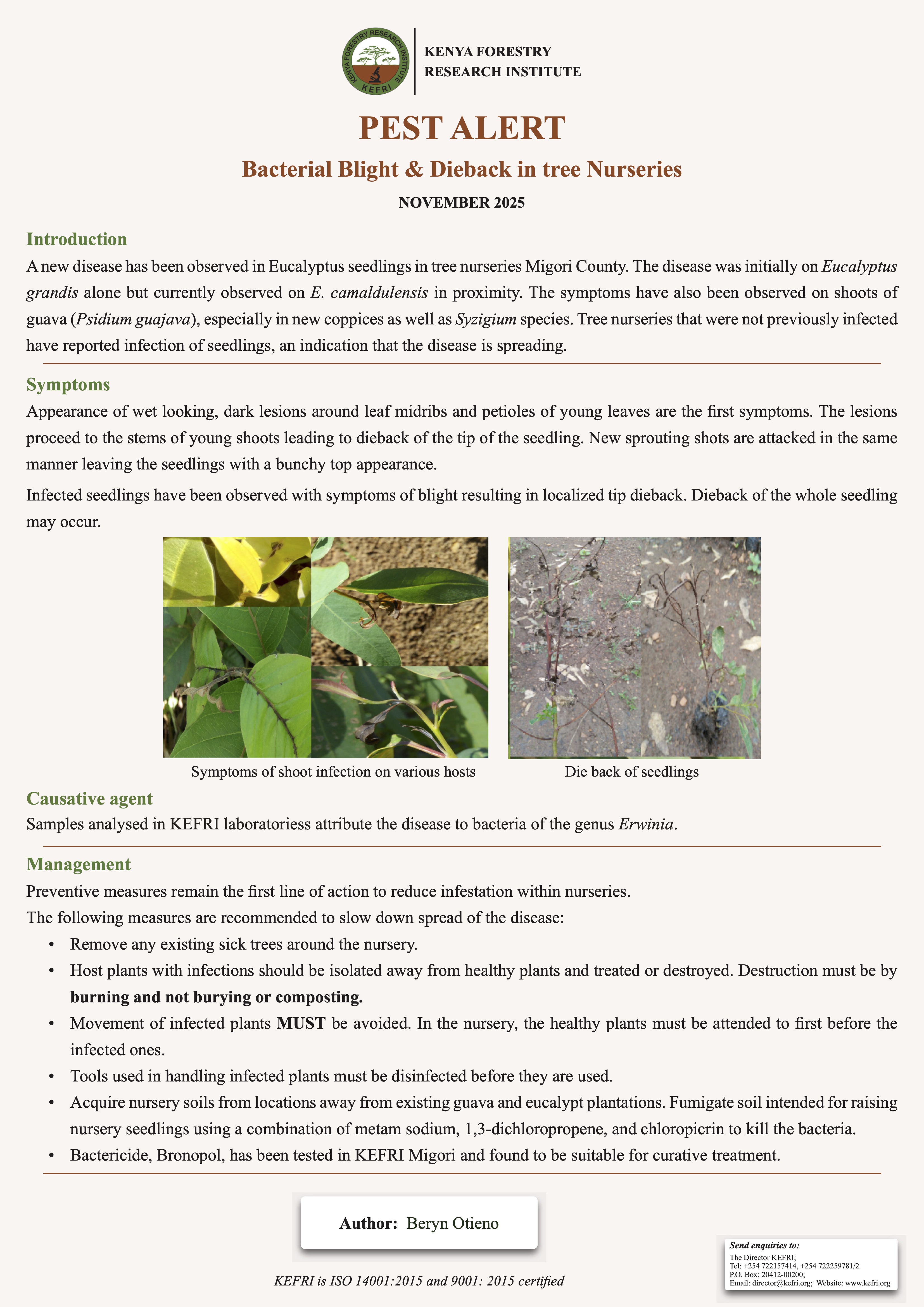
KEFRI and JICA Conclude Second Regional Training on Climate-Resilient Forestry in Africa
The Kenya Forestry Research Institute (KEFRI), in partnership with the Japan International Cooperation Agency (JICA), has successfully concluded the second on-demand Regional Training on Promoting Climate-Change-Resilient Forestry in Africa at KEFRI Headquarters, Muguga, Nairobi.
The three-week programme convened forestry and natural resources professionals from Somaliland, the Kingdom of Eswatini, Eritrea, Ethiopia, Zambia, Zimbabwe, Kenya, and other African countries, providing a practical platform to share solutions that strengthen climate resilience across African landscapes.
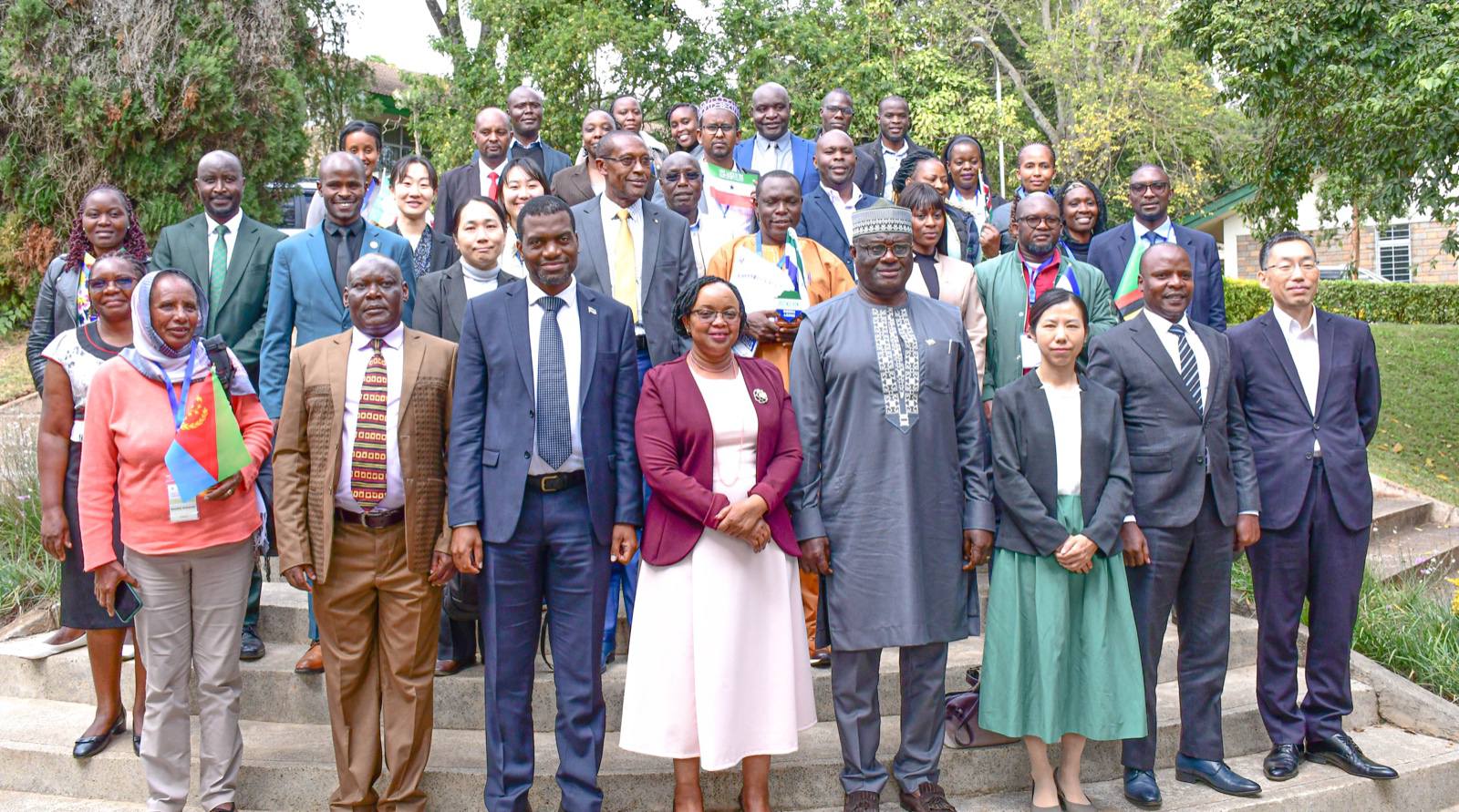
The closing ceremony was officiated by Dr. Jesse Owino, representing the Principal Secretary, Mr. Mugambi Gitonga (State Department for Forestry). JICA Kenya Office was represented by Mr. Fumihiko Suzuki, while KEFRI was represented by Dr. Musingo Mbuvi, Senior Deputy Director, Research and Development, on behalf of the Director, Dr. Jane Njuguna. Earlier, the opening ceremony was graced by Mr. George Tarus, Forest Development Secretary (on behalf of the PS), alongside distinguished guests including H.E. Gen. (Rtd.) Peter K. Lavahun, High Commissioner of Sierra Leone; Mr. Ontumetse Anthony Ontumetse, Deputy High Commissioner of Botswana; Dr. Thomas Kiptoo, Acting Deputy Chief Conservator of Forests; Mr. Makoto Shinkawa, Chief Representative, JICA Kenya Office; and Ms. Kanako Sasai, First Secretary, Embassy of Japan.
Participants were equipped with technical knowledge and hands-on skills in:
High-quality tree germplasm development
Tree improvement and breeding
Climate-smart forestry and agriculture technologies
Effective communication and technology transfer for scaling proven practices
The training featured immersive practical sessions at KEFRI’s Seed Centre and laboratories, and field work in the Kitui Eco-Region focusing on Melia volkensii and other dryland tree species.
A capstone field visit to KEFRI Kibwezi Sub-centre (Makueni County) was led by Dr. Michael Okeyo, Assistant Regional Director. The delegation explored commercial forestry development in drylands, with emphasis on the role of Melia volkensii (Mukau) in climate adaptation and livelihoods. A highlight was a farm learning tour hosted by Mr. Jonathan Kituku, a long-term KEFRI collaborator whose 400-acre demonstration farm showcases successful dryland forestry—generating income through seed and seedling sales and offering peer training to fellow farmers.
Species Spotlight: Melia volkensii (Mukau)
Renowned for fast growth, drought tolerance, and durable, termite-resistant timber, Melia volkensii is emerging as a cornerstone species for dryland afforestation and enterprise, aligning climate resilience with household and community income generation.
In his remarks, Dr. Owino commended participants’ commitment and urged them to apply the acquired skills in their home institutions and landscapes. Participants lauded the programme’s practical orientation, peer networking, and regional knowledge exchange.
This training is implemented under the SFS-CORECC Project—Strengthening Forestry Sector Development and Community Resilience to Climate Change—a KEFRI–JICA collaboration that supports:
Climate-smart forestry solutions in drylands
Community-centred value chains and livelihoods
Scalable technology transfer and policy-informed practice
With climate variability intensifying across Africa, the KEFRI–JICA partnership is accelerating capacity building that links science, practice, and community outcomes. Graduates of the programme return to their countries better prepared to scale high-impact restoration, improved germplasm use, and climate-resilient forestry models.
PEST ALERT - Cypress and Juniper dieback in Kenya
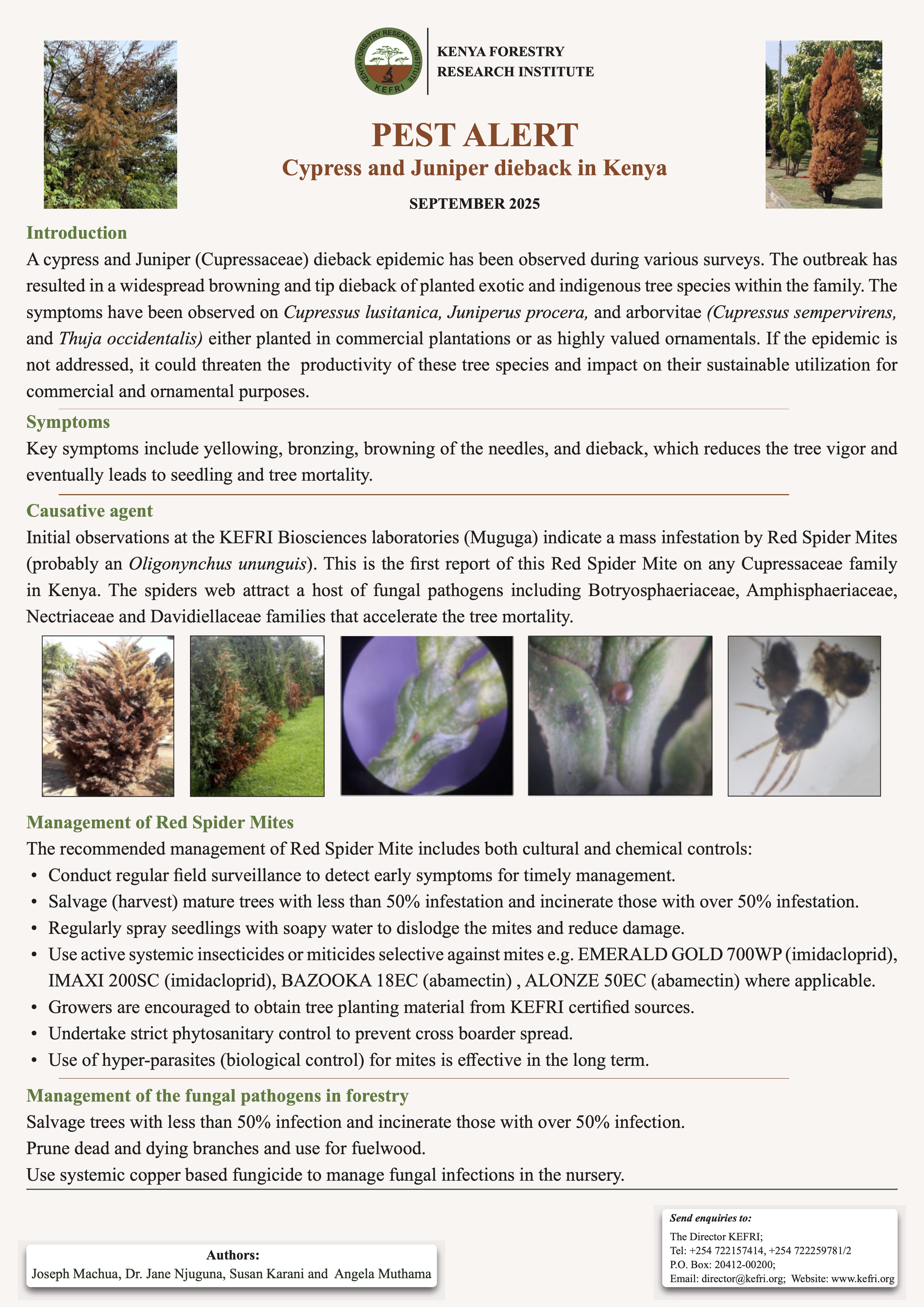
KEFRI Graduate School and JKUAT Host Stakeholders Engagement Forum
The KEFRI Graduate Research School (KGRS), in collaboration with Jomo Kenyatta University of Agriculture and Technology (JKUAT), has launched a two-day Stakeholders Engagement Forum at KEFRI Headquarters in Muguga. The forum marks a significant step toward operationalizing the KEFRI Graduate School, which will soon begin offering advanced degree programmes in forestry research and related disciplines.
The forum was officially opened by Prof. Thuku Thiong’o from JKUAT, who represented the Deputy Vice Chancellor, Academic Affairs. He noted that the Commission for University Education (CUE) and the JKUAT Senate are currently reviewing the curriculum for the Graduate School to ensure alignment with national and international academic standards. In his remarks, Dr. Musingo Mbuvi, representing the Director of KEFRI, reaffirmed the Institute’s readiness to launch the school, emphasizing institutional commitment and preparedness. “We have the commitment and willingness to be trained and effectively operate the graduate school,” said Dr. Mbuvi.
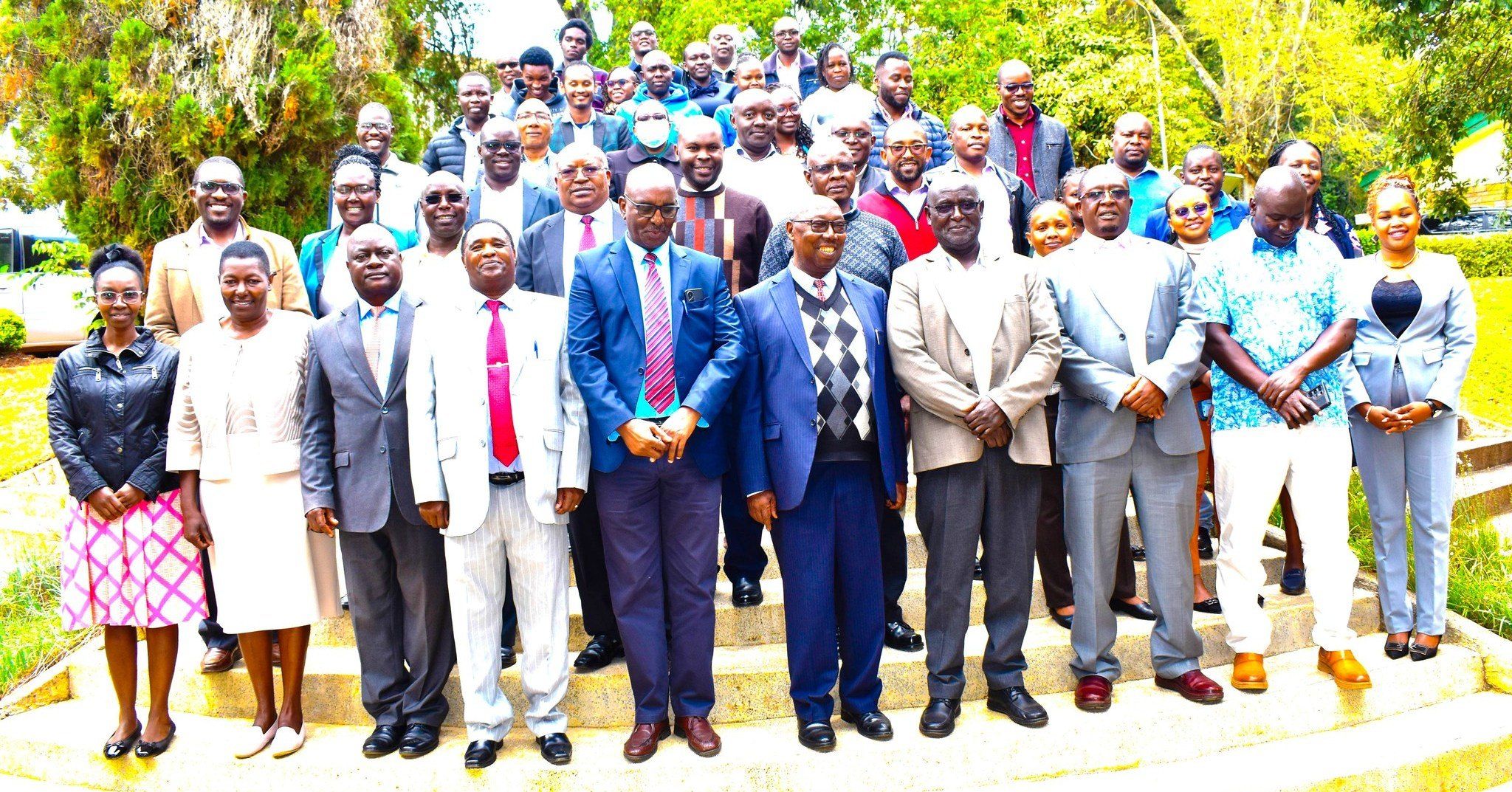
The KEFRI Graduate Research School will offer competitive master’s degree programmes focused on forestry science and applied research. Among the courses to be introduced are:
MSc. Microbiology (Forest Pathology)
MSc. Botany (Plant Ecology)
MSc. Genetics
MSc. Zoology (Entomology) and other specialized options aligned with KEFRI’s research mandate and Kenya’s forestry development agenda.
These programmes aim to produce highly skilled professionals capable of driving sustainable forest management, innovation, and ecosystem resilience in Kenya and beyond.
Participants in the engagement forum are drawn from KEFRI and JKUAT—a team of seasoned experts tasked with reviewing the proposed curriculum and recommending enhancements to ensure it meets emerging sectoral needs. Dr. Eston Mutitu, Chairperson of the Technical Graduate School Committee of Experts, outlined progress made so far, noting that the school is being anchored on the Forest Conservation and Management Act (FCMA) and existing human resource frameworks to ensure institutional sustainability and compliance.
During the forum, Dr. Joram Kagombe updated participants on Kenya’s preparations to host the International Union of Forest Research Organizations (IUFRO) World Congress in 2029—a historic achievement for the country and continent. The IUFRO Congress, set to be held in Kenya through KEFRI’s leadership, will be the first-ever IUFRO conference to take place in Africa, following a successful bid that saw Kenya emerge ahead of Canada. Dr. Kagombe called for collaboration among all stakeholders to ensure the success of this global event, which is expected to showcase Africa’s leadership in forestry research, innovation, and sustainable resource management.
The establishment of the KEFRI Graduate Research School, in partnership with JKUAT, reflects a shared vision for advancing forestry education, research excellence, and capacity development. By integrating scientific research with postgraduate training, the school will not only enhance Kenya’s human capital in forestry but also strengthen Africa’s position in the global forest science community.
KEFRI Wins Top Award for Innovation at Africa Public Service Week 2025 and Continental Recognition in Addis Ababa, Ethiopia
Kenya Forestry Research Institute (KEFRI) was honored as the Overall Winner in the Technology and Digitalization Category during the Africa Public Service Week 2025, held at Kenyatta International Convention Centre (KICC), on 12th June 2025 in Nairobi. The award was presented to KEFRI’s Director, Dr. Jane Njuguna, by the Principal Secretary for Public Service, Dr. Jane Kere Imbunya, during the official closing ceremony of the continental event.
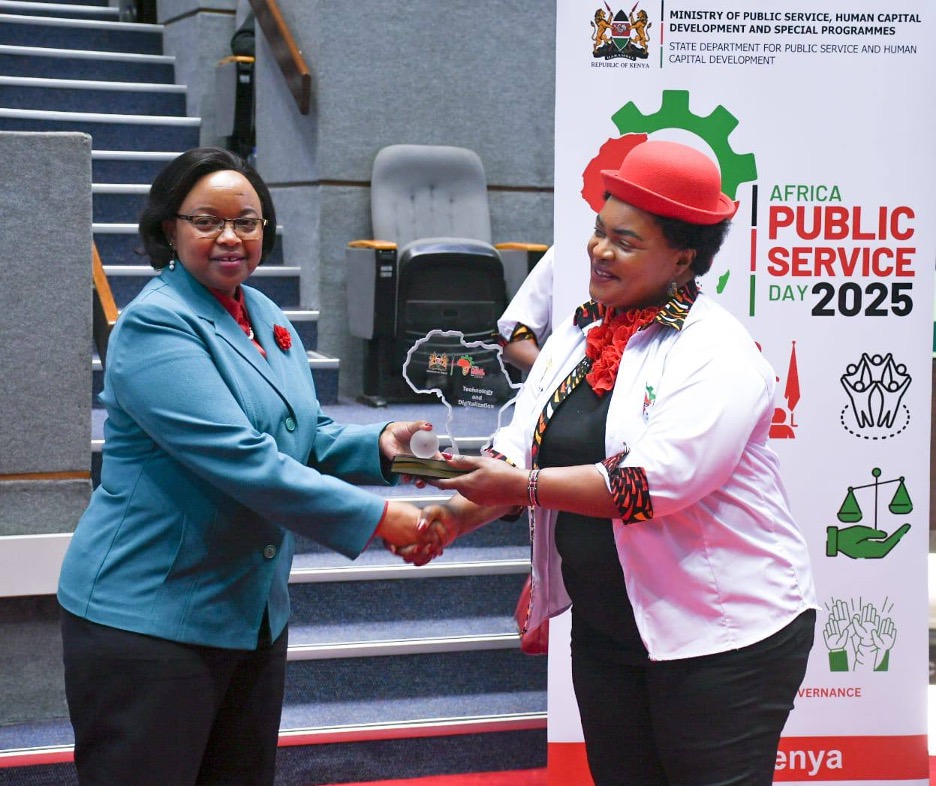
Building on this recognition, KEFRI participated in the 10th Continental Africa Public Service Day celebrations that took place from 21st to 23rd June 2025 in Addis Ababa, Ethiopia. The event, hosted by the African Union Commission in collaboration with the Government of Ethiopia, brought together public service leaders and innovators from across the continent to exchange ideas and showcase solutions that enhance public sector delivery.
During the Addis Ababa forum, KEFRI’s JazaMiti platform earned further continental acclaim, securing First Runners-Up in the Most Transparent and Accountable Organization Award category. This marked the platform’s fifth major recognition for its impact in translating complex scientific forestry data into a user-friendly, digital public service. JazaMiti’s ability to recommend tree species best suited to specific environments has significantly improved seedling success rates, while reducing losses from pests and disease.
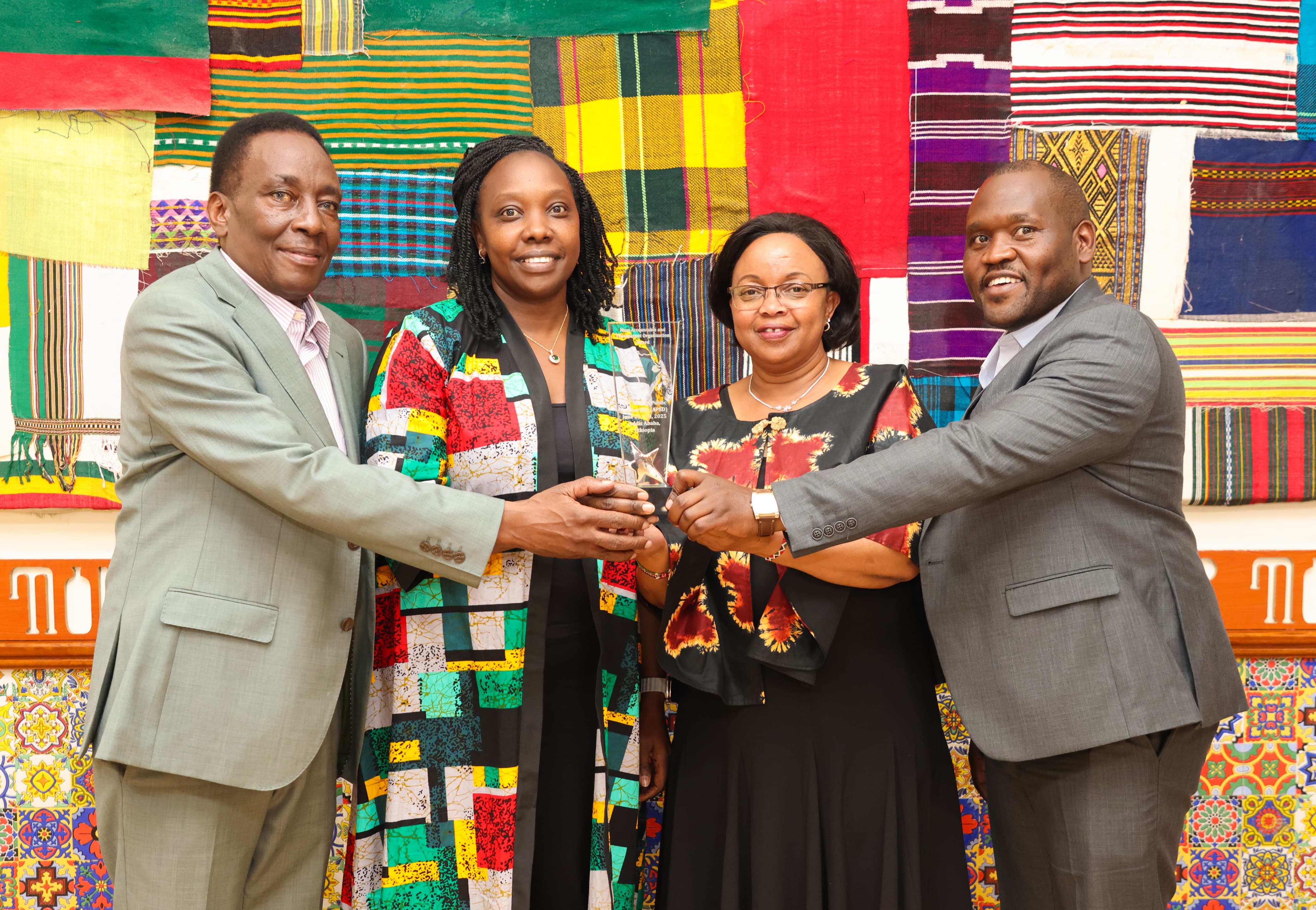
Beyond its technical strengths, the platform also plays a pivotal role in Kenya’s environmental restoration efforts. It functions as a central digital system for tracking and recording national tree planting activities, contributing to the 15 Billion Tree Growing Initiative set to run through 2032. By making this data open and accessible, JazaMiti supports accountability and public engagement in achieving Kenya’s ambitious reforestation goals.
KEFRI acknowledges the continued support of the Ministry of Environment, Climate Change and Forestry, as well as its partners and stakeholders, in making this innovation a success.
Cabinet Secretary Dr. Deborah Barasa Inaugural Visit to KEFRI
The Cabinet Secretary for Environment, Climate Change and Forestry, Dr. Deborah M. Barasa, made her inaugural visit to KEFRI Headquarters on 9th May, 2025. She was accompanied by the Principal Secretary, State Department of Forestry Mr. Gitonga Mugambi, CBS, and the Chairman KEFRI Board of Directors, General (Rtd) Samson Mwathethe. The delegation was warmly received by KEFRI Director Dr. Jane Njuguna and Senior Management and staff.
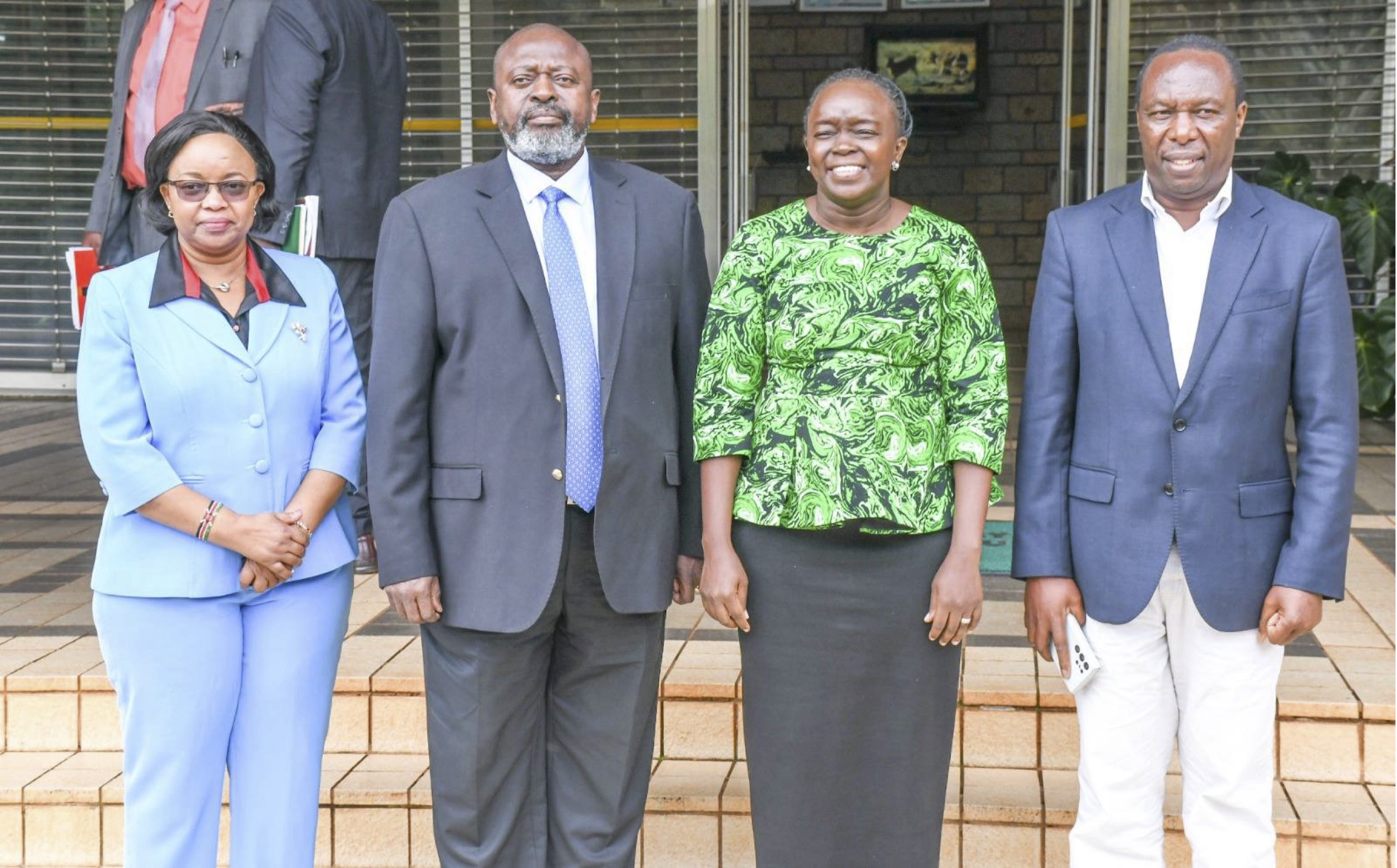
The visit kicked off with a briefing session at the KEFRI Boardroom, where Dr. Barasa and her team were taken through the Institute’s history and milestones. Key highlights included KEFRI’s regional footprint and the proposed expansion to various counties namely Narok, Kajiado, Marsabit, Mandera, Kwale, Mt. Elgon, and Cheborgeon. The CS was also informed that KEFRI has so far distributed 103 metric tonnes of seeds, equating to 1.545 billion seedlings across the country in support of the national 15 billion tree campaign.
During the meeting, the Cabinet Secretary urged the lnstitute to embrace modern technologies such as aerial seeding and adopt fruit trees and agroforestry as one of its strategies to boost forest cover and improve livelihoods. Emphasis was laid on the need for KEFRI to work with the resources at its disposal and to connect directly with ordinary Kenyans by demonstrating how livelihood can be earned through products such as bamboo, gums and reisins, palm oil, and Indian sandalwood as part of value addition.
During the meeting, the Cabinet Secretary urged the lnstitute to embrace modern technologies such as aerial seeding and adopt fruit trees and agroforestry as one of its strategies to boost forest cover and improve livelihoods. Emphasis was laid on the need for KEFRI to work with the resources at its disposal and to connect directly with ordinary Kenyans by demonstrating how livelihood can be earned through products such as bamboo, gums and reisins, palm oil, and Indian sandalwood as part of value addition.
A consensus emerged on the need to establish a national botanical museum to showcase Kenya’s rich flora and fauna. The museum will serve as a source of income and education while enhancing national pride. The JazaMiti App was lauded as an innovation which will ensure species to site matching thus increasing tree survival rates.
The session also spotlighted KEFRI’s homegrown innovations such as the vellerani and half-moon technologies, ensuring seed viability in arid areas. The potential of Bamboo as a multipurpose species with applications in housing—an area of strategic interest to the government, was also discussed.
Other presentations highlighted how plant-based solutions play a role in combating drug resistance, KEFRI’s collaboration with ILO PROSPECTS on controlling the invasive Prosopis juliflora, and ongoing partnerships with universities to nurture the next generation of scientists. KEFRI also announced it had secured hosting rights for the upcoming IUFRO (International Union of Forest Research Organizations) Conference in 2029.
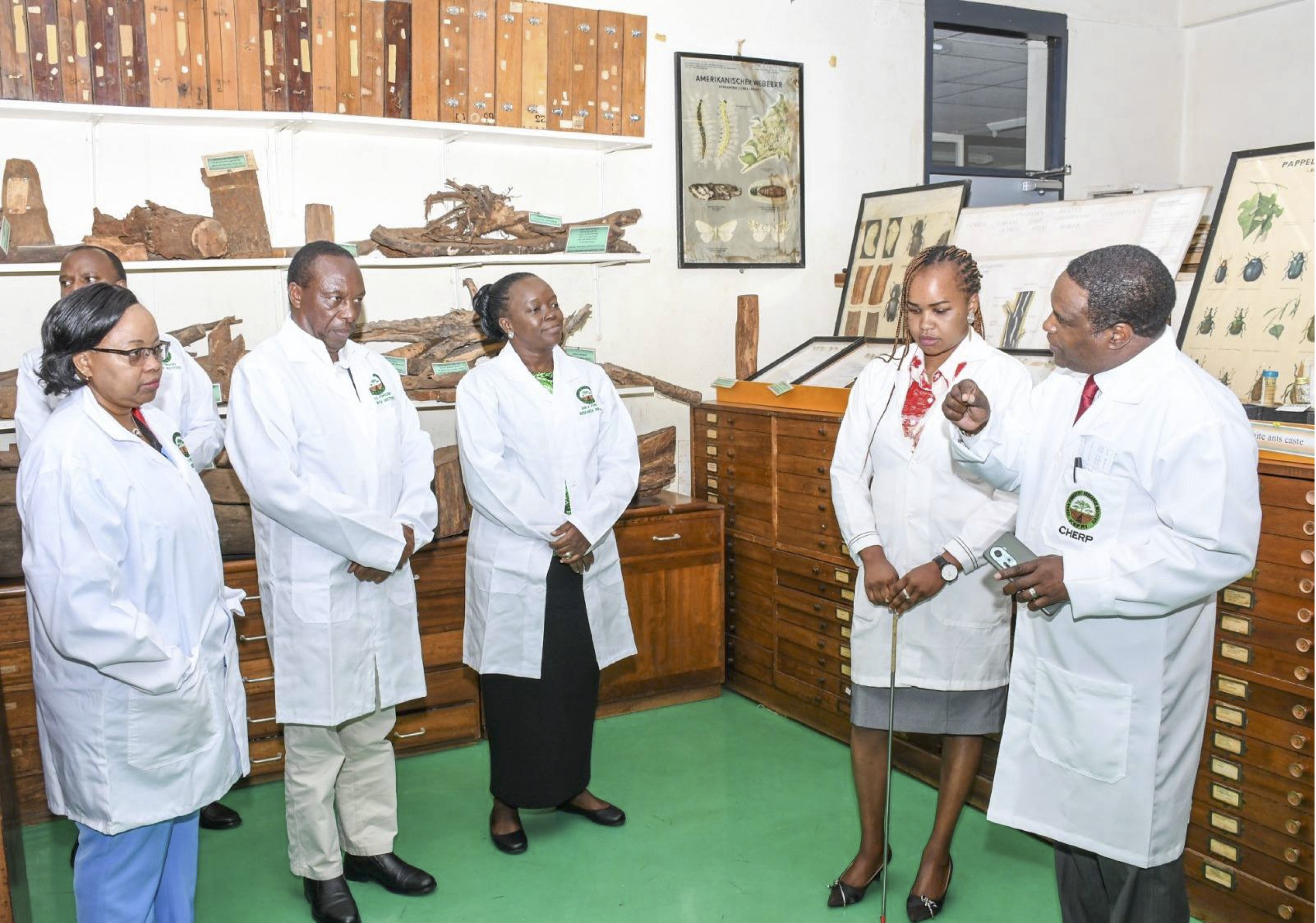
“I have tasked our teams to look at the value of the trees we are planting, carbon sequestration because we are not only just planting trees but also the impact to communities and improving livelihoods,” said Hon.Barasa.
JazaMiti Application wins KEFRI two Prestigious Awards at the Digital Transformation Public Sector Forum
KEFRI demonstrated its leadership in technological innovation by securing two esteemed awards at the Digital Transformation Public Sector Forum & Awards 2025, held on 28th February at Pride Inn, Mombasa.
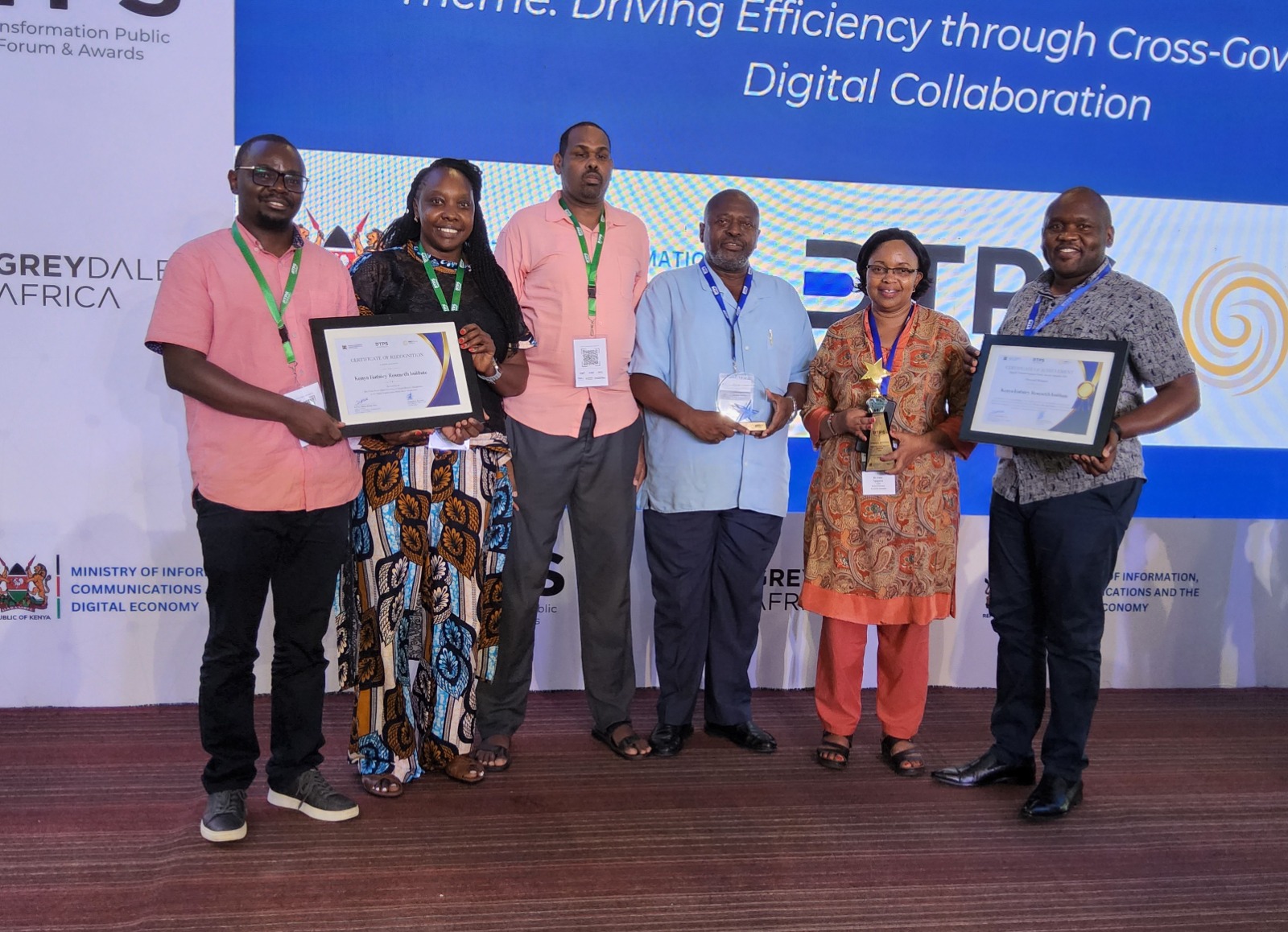
The Institute bagged the Best Public Sector Digital Innovation Award in Natural Resource Management. It was also crowned the Overall Winner in recognition of groundbreaking work in digital innovation for environmental conservation in addition to continued dedication to advancing technology for the public good.
These Awards recognized public sector organizations that have consistently leveraged technology to improve their effectiveness, efficiency, transparency, and service delivery to citizens. The awards were received by KEFRI Board Chairman Rt. Gen. Samson Mwathethe and Director KEFRI Dr. Jane Njuguna.
CS Duale Launches the Regreening for The Future Project
Dr. Jane Njuguna Director KEFRI on behalf of the CS Ministry of Environment, Climate Change and Forestry Hon. Aden Duale today launched the “Regreening for The Future Project- Integrating Climate Change Adaptation pathways into community-led regreening in East Africa”, at Eka Hotel, Nairobi.
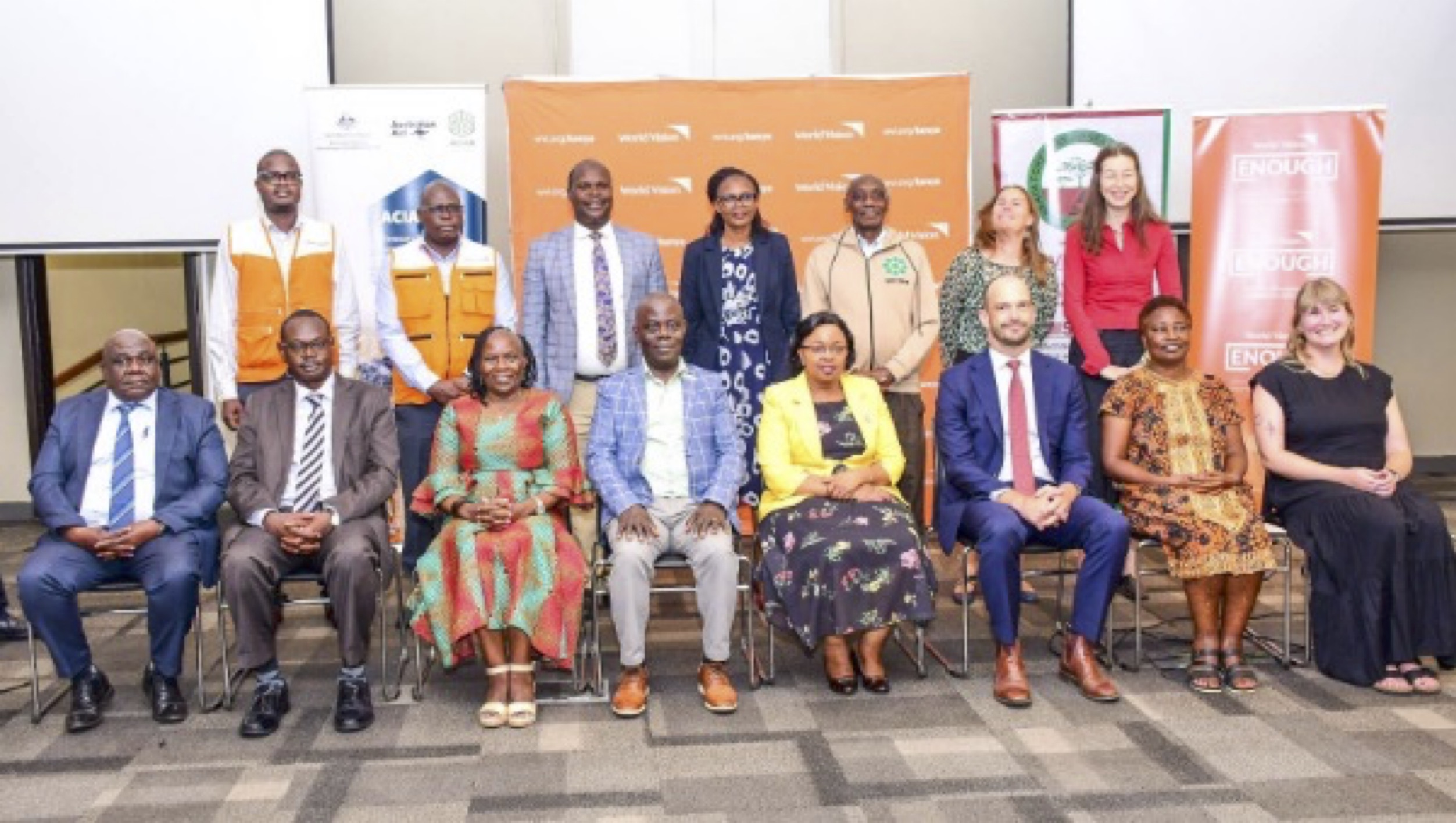
The 5-year project aims to integrate climate change adaptation pathways into community led Regreening in East Africa focusing in Makueni, Nyandarua, Homa Bay and Nyamira counties.
The project, an Australian-Kenyan initiative funded by the Australian Centre for International Agricultural Research (ACIAR) and delivered in partnership with World Vision Australia and Kenya, Kenya Forestry Research Institute (KEFRI), Centre for International Forestry Research (CIFOR-ICRAF), The University of Nairobi, Australian High Commission and The United Nations University.
Mr. Christopher Ellinger, Charge d'affaires Australian High Commission in Kenya, emphasized the significance of integrating climate change and adaptation pathways with communities. "The champions of this project is the community and their input is invaluable," he said.
"I am glad to note that this project aims to integrate climate adaptation pathways within a community-led regreening model and will help communities to enhance their capacity to adapt to climate change," said Dr. Njuguna.
The project will focus on three main areas: integrating climate adaptation research into land restoration to enhance tree cover and resilience, utilizing evidence-based stakeholder engagement to inform policy and developing a monitoring and evaluation framework for adaptation pathways in re-greening communities. The project will identify knowledge and develop capacity for researchers and farmers to develop regreening projects that anticipate future climate scenarios that are adaptive over time. It also aims to identify the policy framework and enabling environments that will empower farmers and communities to undertake landscape restoration and regreening activities that are sustainable, enhance food security and build resilience to climate change. Further, the project is expected to considerably add value to Kenya, which has grappled with challenges related to deforestation, land degradation, and desertification. All these issues have posed a risk to the country’s biodiversity.
KEFRI absorbs Kenya Water Towers Agency Staff
On January 27, 2025, Dr. Jane Njuguna received 24 staff redeployed from the defunct Kenya Water Towers Agency (KWTA) as per the directive from the Cabinet Secretary for Environment, Climate Change and Forestry Hon. Aden Duale. Several other staff were redeployed to various agencies within the Ministry.
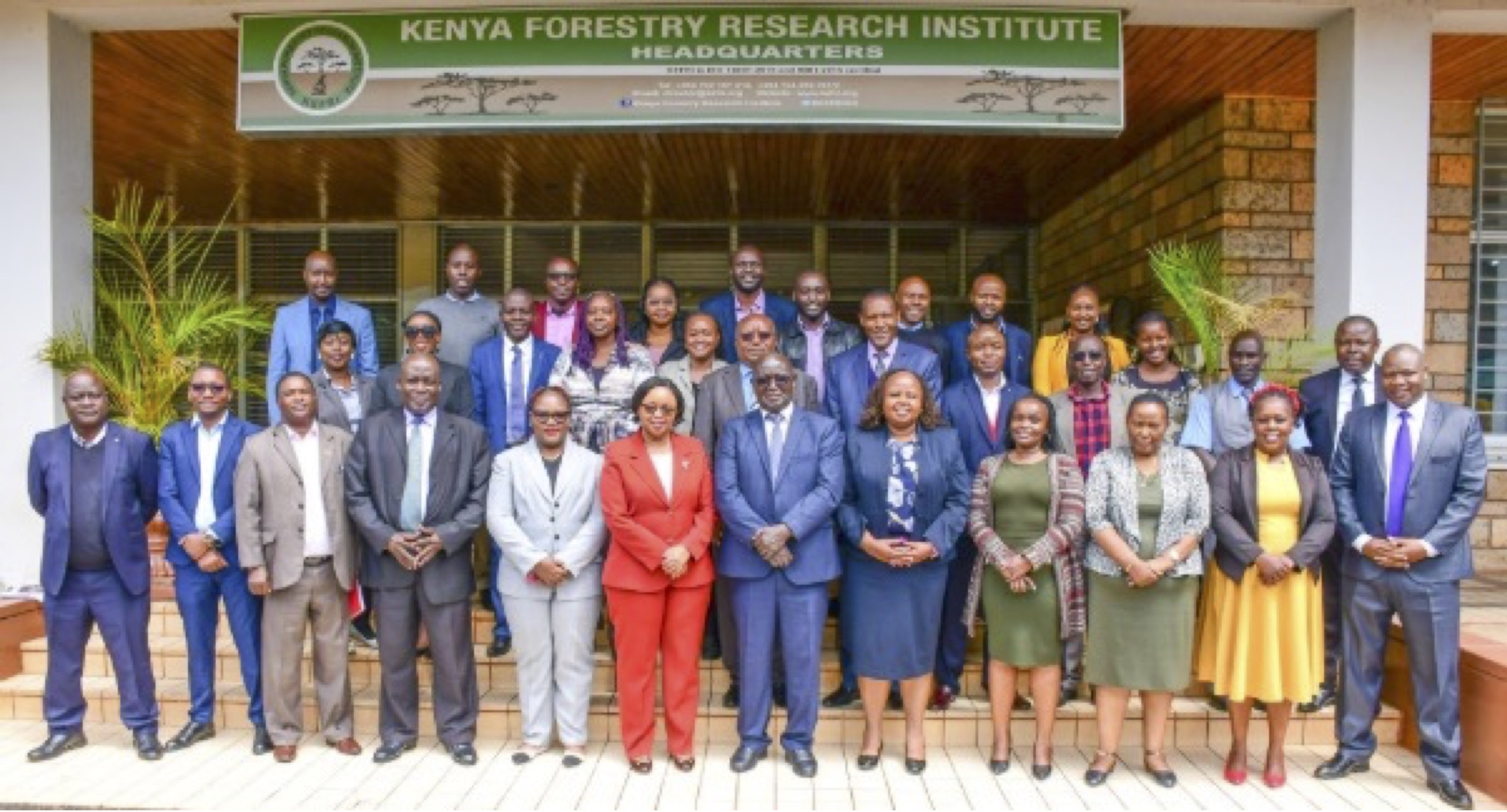
KWTA was dissolved following the Cabinet sanctioned rationalization of State Corporations with overlapping or duplicating mandates. The Agency became the first one in a raft of measures to be undertaken by the government. “No one will lose a job, we will ensure everyone is deployed to a new station,” CS Duale said while making pronouncement to dissolve the Agency in January 2025.
While welcoming the new staff to KEFRI, Dr. Njuguna urged them to feel at home and be ready to deliver optimally since excellence at KEFRI is not an option. She added that the additional workforce will enable KEFRI hasten its speed in achieving its mandate especially in delivering high quality seeds for the 15B tree growing programme.
The staff were deployed in various departments including research, communication, ICT, administration, human resources among others.
CS Duale lauds KEFRI’s efforts in eradicating Mathenge in Garissa County
Cabinet Secretary for Environment, Climate Change and Forestry Hon. Aden Duale on February 1st, 2025, visited the Kenya Forestry Research Institute (KEFRI) sub-centre in Garissa to assess ongoing efforts in managing the invasive Prosopis Juliflora locally known as Mathenge. His visit began with a courtesy call to the Garissa County Governor HE. Nathif Jama highlighting the government’s commitment to addressing environmental challenges in arid and semi-arid regions. Accompanied by the Principal Secretary for Forestry Mr. Gitonga Mugambi, KEFRI Director Dr. Jane Njuguna, Board of Directors, and Senior Management.
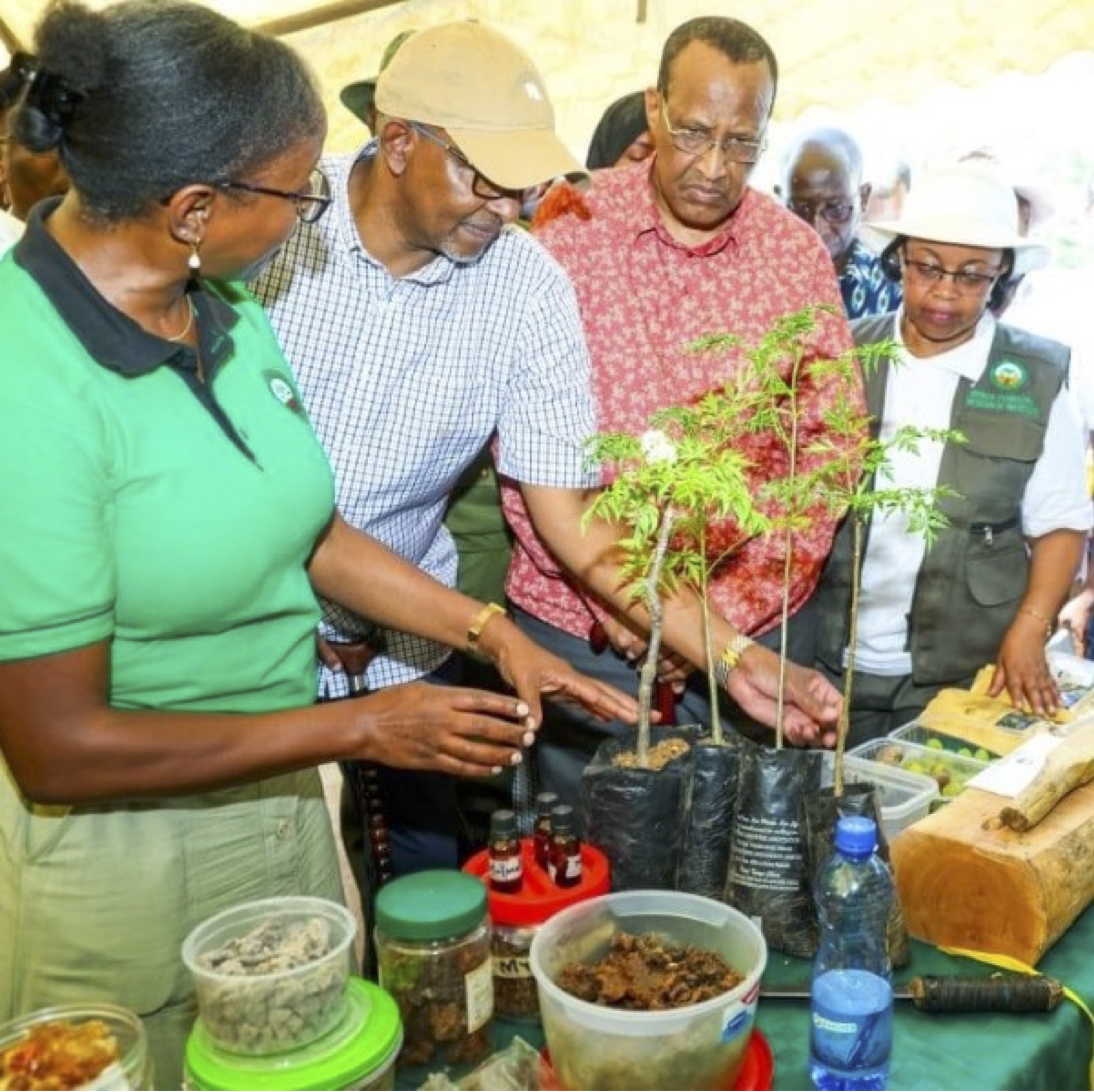
The CS proceeded to inspect key project sites demonstrating innovative approaches to Prosopis control and utilization. At Jamhuri Farm, in Garissa Township, the CS visited the Environmental and Infrastructure Investment Programme (EIIP) Site 1, where KEFRI showcased the mechanical removal and utilization of Prosopis. A key highlight was the demonstration of seed ball technology for grass reseeding, a technique aimed at restoring degraded landscapes. “The fight against Prosopis is not just about removal but also about restoring our rangelands for sustainable livelihoods,” remarked the CS.
Further, KEFRI demonstrated modern charcoal production using improved kilns, showcasing a sustainable approach to utilizing Prosopis. This initiative aligns with the government’s broader agenda of promoting alternative community livelihoods while addressing environmental degradation. The event culminated in a public baraza, where the KEFRI team exhibited various products derived from Mathenge, including charcoal briquettes, furniture, chicken feed, cake and bread.
Members of the community had the opportunity to engage with experts on the sustainable management of Prosopis. The CS emphasized the importance of research-driven solutions, stating, “Institutions like KEFRI play a vital role in providing scientific solutions to environmental challenges affecting our people.” The visit underscored the government’s commitment to supporting research and community-driven interventions in tackling Prosopis menace. “KEFRI continues to lead in innovative approaches to managing invasive species, contributing to environmental conservation and sustainable development in Kenya’s drylands” Dr Njuguna said.
Prosopis Juliflora originated in the Central and South America and was introduced in Kenya in the 1980s. The World Bank partnered with Kenya’s Ministry of Environment, rallying local communities to afforest—to plant trees where there previously were none. The idea was to rehabilitate degraded lands. Mathenge is a resilient plant that grows in areas with limited water and thus was recommended to the ASAL counties such as Baringo, Turkana, West Pokot, Garissa, Wajir, Marsabit, Mandera, Tana River and Makueni and Kitui.
Kshs 30M Project to Manage Prosopis juliflora Launched in Turkana County
KEFRI in partnership with International Labour Organization (ILO) Prospects and Turkana County Government launched the 'Prosopis Management for Green Jobs & Livelihood Support' Project in the county. The Ksh 30 million project is aimed at sustainably managing Prosopis juliflora to create green jobs and improve livelihoods in Turkana West.
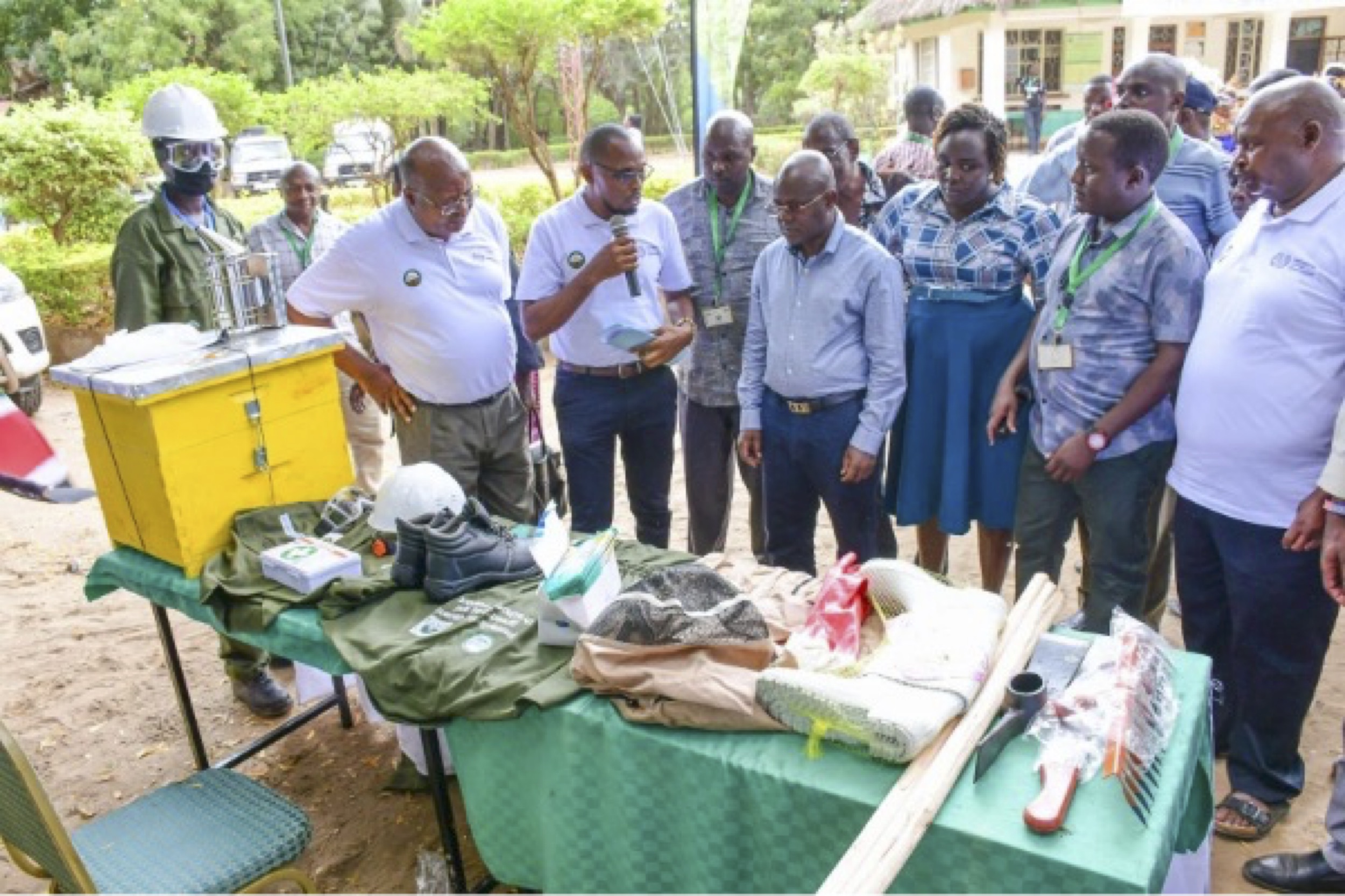
With a one-year implementation plan, the project seeks to transform the invasive species into an economic asset through climate-smart technologies, including briquette and biochar production, animal feed commercialization, and entrepreneurial capacity-building. Prosopis juliflora also known as Etirae in Turkana dialect has become a menace to the community causing harm to the environment, livestock and humanity.
A central feature of the project is the establishment of a Prosopis Training and Incubation Centre. The state-of-the-art facility will equip community members with entrepreneurial skills and enhance their ability to commercialize Prosopis-based products. Through collaborations with the Turkana County Government, Kenya Forest Service, and business stakeholders, KEFRI seeks to change perceptions of Prosopis from being an ecological nuisance to a valuable economic resource. The initiative will adopt an Employment Intensive Investment Approach (EIIP), aiming to create 1,040 green jobs and directly benefit around 8,000 households.
“This project is rooted in research and innovation and is designed to empower communities in Turkana West to address the ecological challenges posed by Prosopis juliflora while unlocking its economic potential,” said Patrick Mwirigi Assistant Regional Director KEFRI Turkana.
Representing the Director KEFRI, Dr. Joram Kagombe stated the importance of the project in developing and upskilling the community. "This project needs to be market driven with tangible financial returns to ensure posterity upon completion of the project", he said. He noted that the project’s success would depend on harnessing research insights and transferring knowledge to the community. KEFRI aims to mitigate the risks associated with the invasive species while maximizing its benefits to improve the livelihoods of locals.
In his remarks, Dr. Erus highlighted that Prosopis juliflora covers 352 Hectares of land, “the County is happy to partner with KEFRI and ILO Prospects to find ways of utilizing Prosopis for value addition and livelihood improvement especially amongst youth and women.” he said.
The project implementation areas are Kakuma, Lopur, Melekech, Nasinyono, Lokangai, Morungole, Leteya and Loritit and will be implemented under three pillars namely Restoration, Product value chain and Policy development.
Dr. Jane Njuguna Appointed First Female KEFRI Director
Dr. Jane W. Njuguna was appointed first female KEFRI Director on 17th December 2024 ushering in a new era of transformative leadership. Her appointment marks a milestone not only for the Institute but also for women in forestry research, as she breaks barriers in advancing the forestry research agenda in the country.
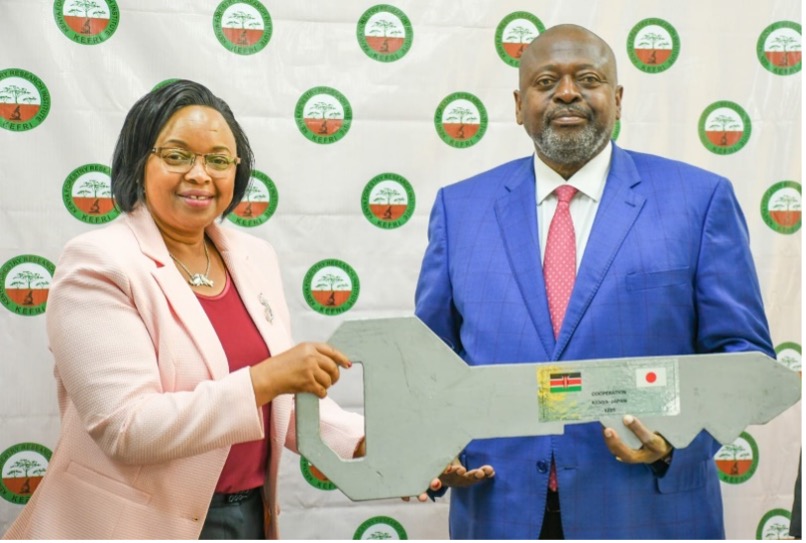
Her appointment was announced by Hon. Aden Duale, Cabinet Secretary for Environment, Climate Change and Forestry. While handing over the instruments of power to Dr. Njuguna, KEFRI Board Chairman Rtd. Gen. Samson Mwathethe stated that the appointment was a reflection on the governments trust in her abilities. “Dr. Njuguna has diligently served the Institute for 36 years. Popularly referred to as tree doctor, her dedication to her work has resulted in this appointment,” he said.
Dr. Njuguna holds a PhD in Forest Mycology and Pathology from the Swedish University of Agricultural Sciences; a master's degree in Forest Science from the University of Melbourne and a Bachelor of Science in Botany and Zoology from the University of Nairobi. She is a member of the Forestry Society of Kenya.
Her rise through KEFRI’s ranks highlights her trailblazing spirit rising from Assistant Research Officer in 1991 to Senior Deputy Director Research & Development in April 2019. On 5th March 2018 Dr. Njuguna was appointed Ag. Director a position she held for 1 year 3 months. In August 2023 she was again appointed Ag. Director a position she held until her confirmation as the substantive Director.
As a passionate tree health researcher alongside her team, she established an Intergrated Pest Management (IPM) system which contributes to developing strategies for managing tree pests and diseases; encouraged the use of aerial seeding technology; developed the JazaMiti application and advocates for species to site matching.
In her inaugural address she extended her gratitude to God for the opportunity, and to the President and the CS for the appointment. She went on further to thank the Board of Directors for their support during her tenure as Ag. Director. “I am elated to have been appointed the first female Director in the history of the Institute. I am committed to deliver on KEFRIs mandate, foster strategic partnerships, enhance capacity building and engage communities in sustainable forestry practices to drive impactful environmental conservation,” she said.
KEFRI Celebrates ISO 9001:2015 and 14001:2015 Recertification
In December 2024, KEFRI achieved a significant milestone by successfully renewing its ISO 9001:2015 (Quality Management Systems) and ISO 14001:2015 (Environmental Management Systems) certifications. These certifications, awarded by the Kenya Bureau of Standards (KEBS), underscore the Institute's unwavering commitment to quality management and environmental stewardship.
Dr. Jane Njuguna Director KEFRI, highlighted that this recertification represents the Institute's dedication to fostering collaboration, safeguarding the environment, and upholding the highest standards in forestry research. She noted that the certifications have led to improved efficiency, better resource management, reduced waste, and enhanced service delivery.
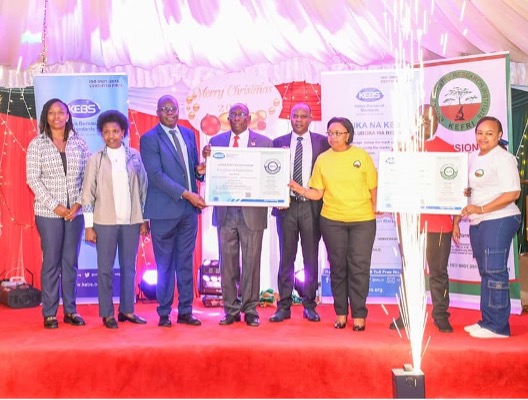
Established in 1986, KEFRI has consistently positioned itself as a leader in forestry research and environmental management within Kenya. Over the years, the Institute has dedicated itself to the sustainable management, conservation, and development of forests and allied natural resources, aligning its operations with international standards.
KEFRI's adherence to these international standards has significantly enhanced its reputation on both national and international platforms. The Institute remains the only state corporation in the Ministry of Environment, Climate Change and Forestry to hold both ISO certifications, underscoring its leadership in forestry research and environmental management.
Signing of Performance Contract 2024/2025 Financial Year
The Cabinet Secretary Ministry of Environment, Climate Change, and Forestry, Hon. Aden Duale, officially signed the Performance Contract (PC) for Kenya Forestry Research Institute (KEFRI) for the 2024/2025 Financial Year on December 13, 2024, at the Ministry Headquarters. The signing took place between the CS and Board Directors Mr. Ntoros Ole Senteu and Ms. Hamara Ibrahim representing the Chairman of the KEFRI Board of Directors, Rtd. Gen. Samson Mwathethe.
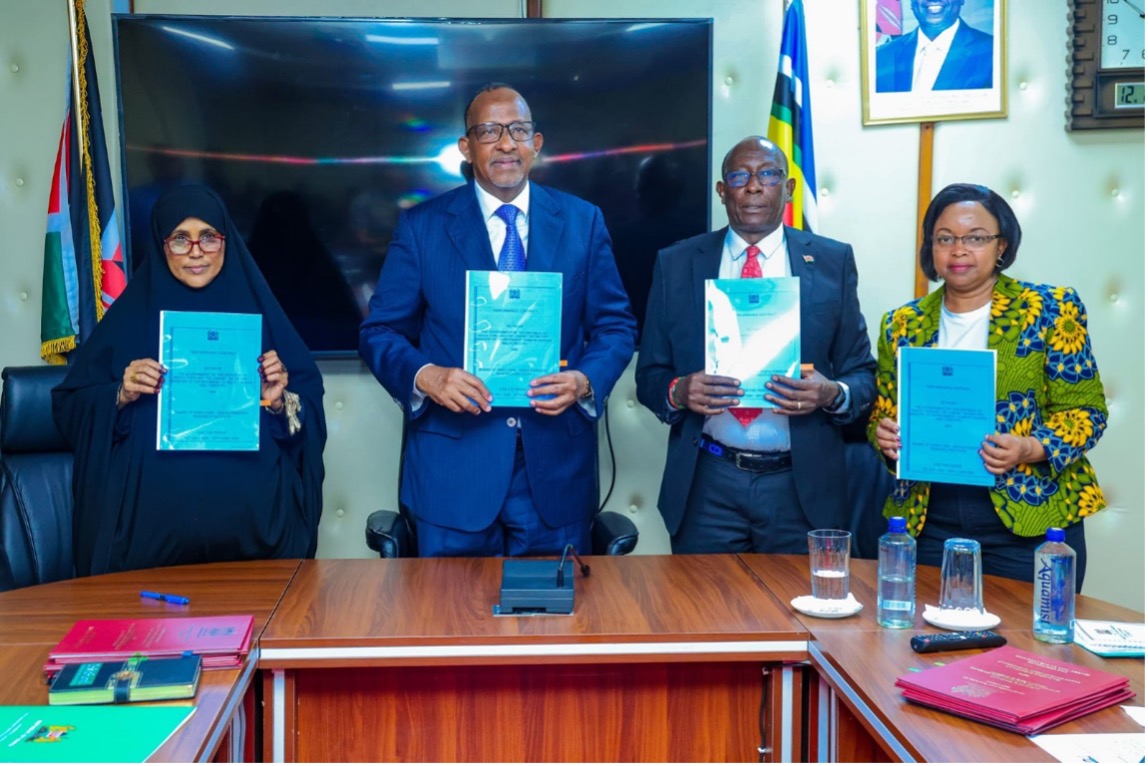 |
The PC is strategically aligned with the Bottom-Up Economic and Transformation Agenda (BETA), which serves as the current Government’s development framework. To ensure seamless implementation and accountability, the PC targets will be cascaded across all levels of KEFRI’s leadership. This includes the Director, Senior Deputy Directors, Deputy Directors, Regional Directors, Assistant Regional Directors, and Heads of Departments, who will further engage their respective teams in fulfilling the outlined objectives.
During the signing, the CS emphasized the need for diligence, integrity, and transparency in the execution of the contract’s commitments. He urged all KEFRI staff to uphold the highest standards of service delivery while safeguarding and responsibly utilizing national resources.
The CS reiterated that success in the implementation of the PC would be measured by tangible results at the end of the financial year, reinforcing accountability and efficiency within the Institute.
“I urge us to draw inspiration from our National Anthem, which calls for unity, justice, and service to our nation. As we embark on this journey, let our work reflect the values of integrity, diligence, and accountability, ensuring that the fruits of our labor contribute to Kenya’s growth and prosperity," said Hon. Duale.
Through the successful implementation of the Performance Contract, the Institute will contribute to the national goal of sustainable development and ecological restoration, ensuring that Kenya’s forestry sector remains a pillar of economic and environmental transformation. KEFRI remains committed to its mandate of advancing research and sustainable forestry practices, playing a crucial role in environmental conservation and climate resilience.
Use of Drone Technologies to Achieve 10% Tree Cover
As KEFRI continues to explore technologies to restore the 5.1 million hectares of degraded lands including grasslands, Senior Deputy Director for Research and Development, Dr. Jane Njuguna led KEFRI scientists in a demonstration of using drone in aerial seeding.
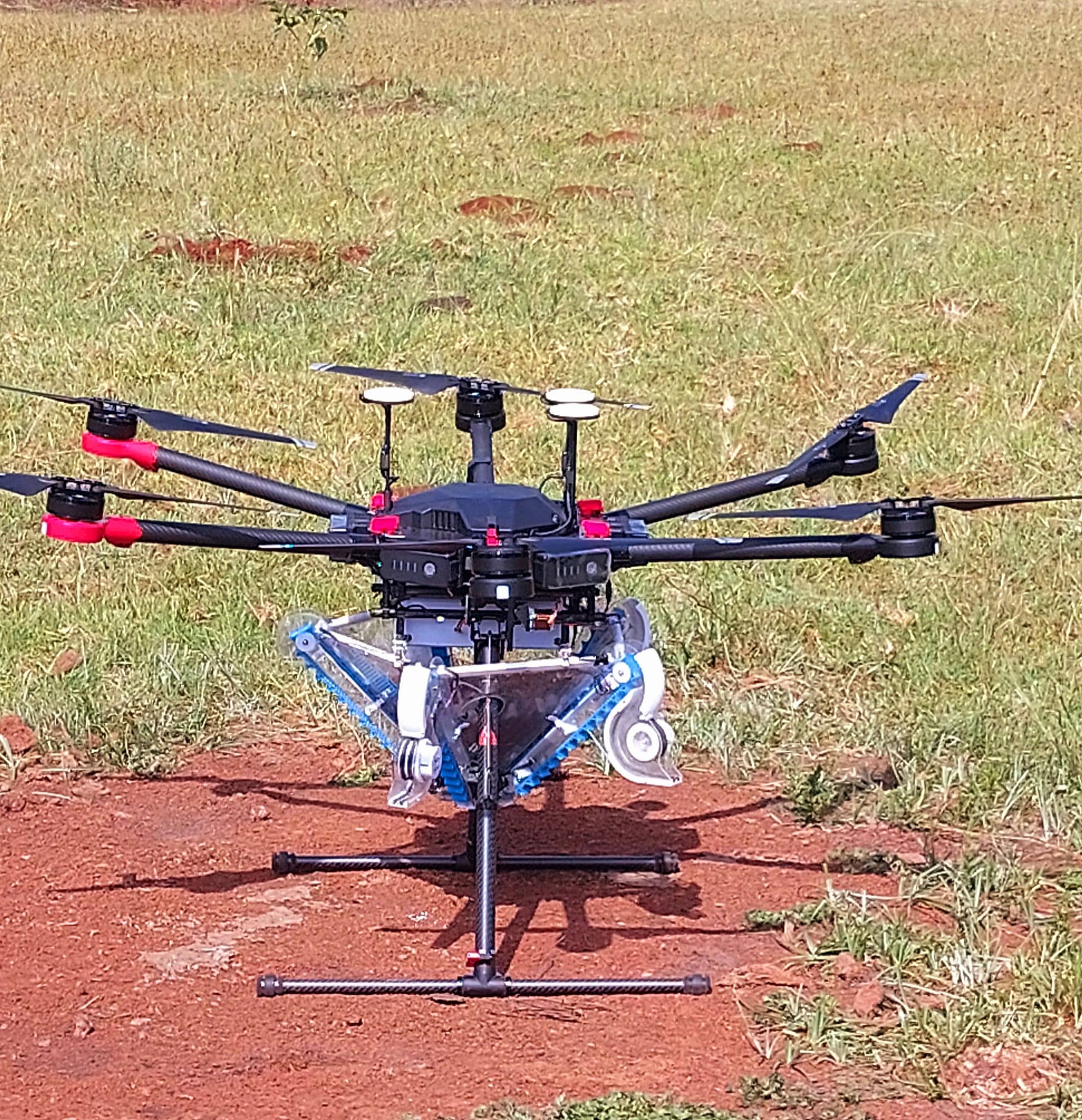 |
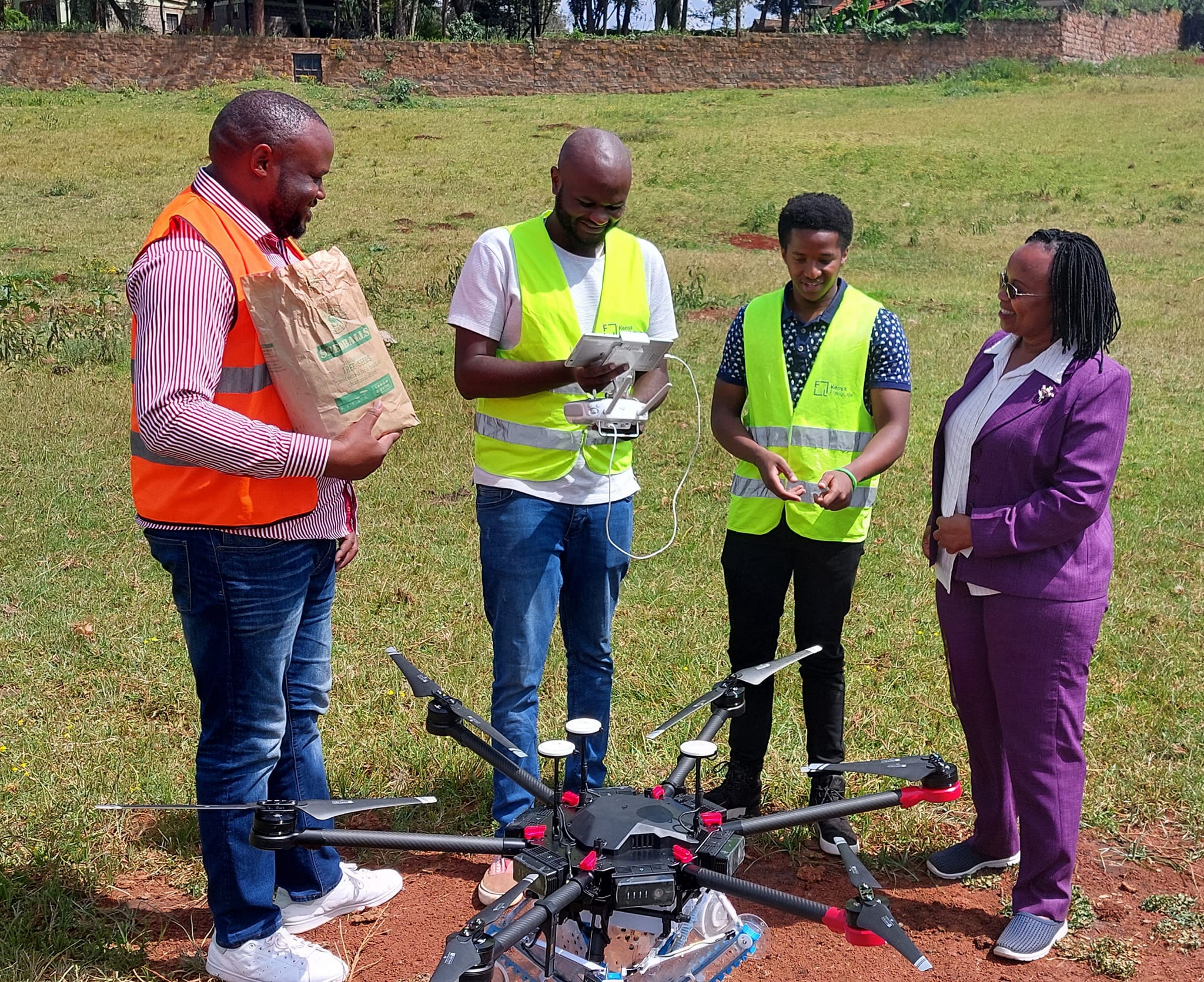 |
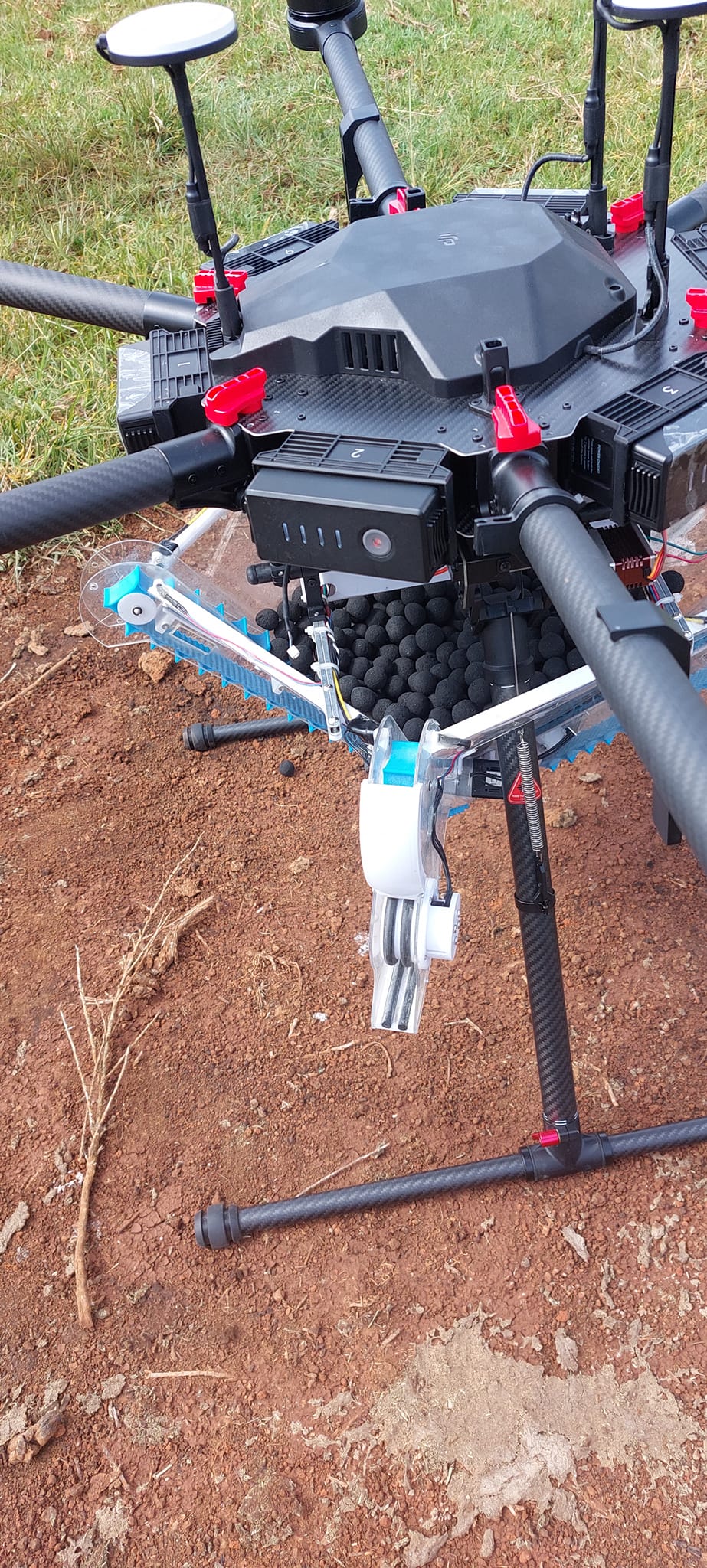 |
The event held at Sigona farm in Kiambu County, involved Drones Space Kenya in partnership with African Tree Researchers, Kenya Flying Labs, Seedballs Kenya and Media houses in demonstration of dispersal of seed balls of Yellow fever tree. The seed were procured from KEFRI and processed into seed balls by Seedballs Kenya Ltd.
According to Dr. Njuguna, calibration on the seeding rate is done before the drone set off. Seeding rate depends on species and expected results. This particular drone has a capacity of 7kg seeds. One flight lasts for 15 mins and covers 0.8 ha = in an hour it can cover 0.8 x 4= 3.2 ha. Assuming a working day, the drone can cover 16 ha within 5 hr compared to 25 man days during a conventional planting. This is very good performance, safe, cost efficient modern innovations and can reseed very difficult terrain including mangrove areas and other ecological restoration. Stakeholders can regreen/ restore degraded areas within a short time.
Co-operative Bank Makes a Donation Towards the Upcoming Commercial Forestry Investment Conference.
The Co-operative Bank of Kenya Ltd has donated Kenya shillings Five Hundred Thousand (Kes.500, 000) to support the upcoming Kenya Commercial Forestry Investment Conference and Expo scheduled from November 23rd to 26th, 2021 at KEFRI Headquarters, Muguga.

Silvance Nono from Co-operative Bank of KEnya giving a cheque to KEFRI CEO, Dr. Joshua Cheboiwo towards the Conference.
The Head of Government & Public Sector Banking and Relationship Bank Manager Mr. Silvance Nono, together with Mr. Wesley Rotich donated the cheque to Director KEFRI Dr. Joshua Cheboiwo during a courtesy call to KEFRI headquarters on 3rd November, 2021.
The Director in his welcoming remarks informed the Bank Managers that forestry industry is a potential venture that can generate a lot of revenue in this country, if it is fully explored. “On behalf of KEFRI and the Conference organizing committee, I do appreciate the support the Co-operative Bank has given and encourage other financiers and partnering organizations to register and support the Conference,” said the Director. .
The Conference is a platform for business case study where different sector players including financiers and investors will share information and technologies to enable better understanding of commercial forestry, its value chain and areas of interest worth investing in. “Tree growing is currently a potential business venture, for both private and public partnership, as the country is moving towards attaining ten percent tree cover by 2022,” further said Dr. Cheboiwo. .
The Conference and Expo Theme is “Commercial Forestry Investment for Wealth Creation, Enhancing Manufacturing, Food security, Health and Attainment of 10% Tree Cover in Kenya”. “The Cooperative Bank has applied for accreditation to partner with Institutions dealing with environment and climate change initiatives and that the reason we have responded to the call to support the Conference,” said Mr. Nono. The Conference and Expo is an opportunity for stakeholders in the commercial forestry sector to showcase and exhibit commercial forestry technologies and an opportunity for investors to tap into. The forum will bring together professionals, researchers, wood processors, investors, and other key players in forestry. The Conference will be both physical and virtual. .
KEFRI's CHERP Regional Director Dr. Eston Mutitu and Deputy Chief Conservator of Forests Mr. Patrick Kariuki Preside Over Tree Planting Activity in Nyandarua County.
KEFRI's CHERP Regional Director Dr. Eston Mutitu together with Deputy Chief Conservator of Forests Mr. Patrick Kariuki on Sunday, 31st October 2021, led freedom fighters and other community members in planting 25,000 assorted indigenous tree seedlings to conserve Sasumua dam watershed in Njabini, Nyandarua County.
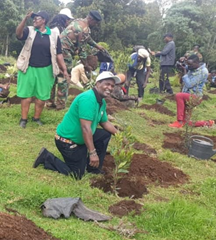
Dr. Mutitu leading community in planting tree saplings at Sasumua watershed
Sasumua reservoir sits on Sasumua River but also receives water from Kibiru and Chania rivers. The dam was first constructed in 1955 and second phase in 1968. It has a capacity of 15.9 million cubic metres, and supplies the city of Nairobi with 15–20% of its water (or about 64,000 m3 per day). The reservoir’s catchment covers approximately 107 km2, lying partly inside a forest reserve and partly in cultivated areas. An area of 55 ha of this, owned by Nairobi City Water and Sewerage Company (NCWSC), has been planted with grass and trees to act as a buffer zone around the reservoir. However, uncontrolled grazing and trampling by animals in the sloppy areas has caused increased surface runoff and soil erosion resulting in dam siltation and thus low water quality. Due to the nearness of the farmlands and the reservoir is threatened by sediment, nutrients and other pollutants.
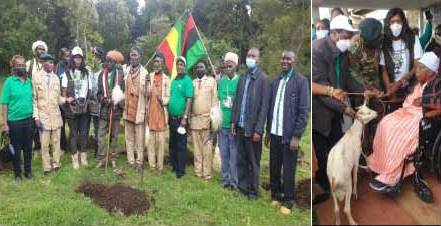
Dr. Eston Mutitu (mid of flags) with Mau Mau freedom fighters/veterans during the tree planting and presentation of the gift to Mrs Mukami Kimathi, in marking the 101 Dedan Kimathi birthday.
KEFRI has been on the ground studying the problem, and donated 1,000 assorted indigenous tree seedlings that were planted to not only conserve the watershed but commemorate the 101 birthday of freedom fighter Field Marshal Dedan Kimathi. Representative from Dedan Kimathi Foundation, freedom fighters, KFS, Equity Bank, Eco-planet, Nairobi Water, local administrators and County officials, Greens of Africa Foundation, ENSDA, WASREB and Cooper Kenya Limited also participated in this important environmental conservation event. Dr. Mutitu and Mr. Kariuki later presented a goat, on behalf of Tharaka Nithi Mau Mau elders, to the elderly Mukami Kimathi, a freedom fighter and widow of Field Marshal Dedan Kimathi signifying a 101 birthday cake.
Dr. Chris K. Kiptoo, PS. Ministry of Environment and Forestry, and Dr. Joshua Cheboiwo, CEO KEFRI Preside Over Woody Weeds + Project Launch.
Woody Weeds + Project to Support Kenya’s National Prosopis Strategy
A new Swiss-Kenyan Woody Weeds + project has been launched to support a National Prosopis Strategy for Kenya which is aimed at the sustainable management of the invasive weed Prosopis juliflora – considered one of the world’s most threatening non-native tree species. The three-year project builds upon the previous Swiss-funded Woody Weeds project which assessed the effects of prosopis on the environment and rural livelihoods in Kenya, Ethiopia and Tanzania as well as ways to manage it. Woody Weeds +, was launched in the presence of representatives from six implementing partners by Dr Chris K. Kiptoo, Principal Secretary for the Ministry of Environment and Forestry, and Dr Joshua Cheboiwo, Director General of the Kenya Forestry Research Institute (KEFRI). The project will strengthen livelihood security and environmental integrity in areas affected by prosopis by supporting the delivery of the National Prosopis Strategy in pilot counties in Kenya.
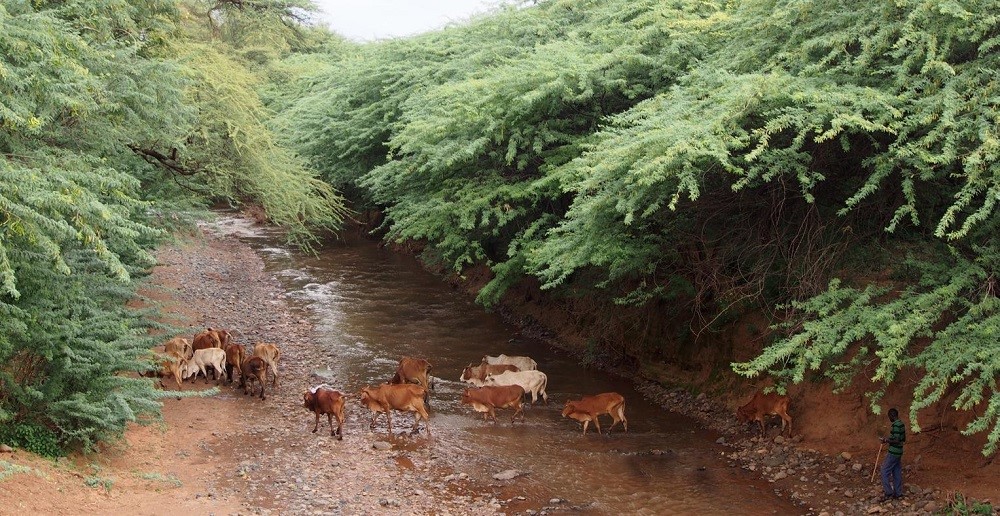
Invasion of Prosopis juliflora along a river near Lake Bogoria, Kenya (Credit: Urs Schaffner, CABI).
Prosopis was introduced to Eastern Africa in the 1970s to provide wood and fodder and reduce erosion on degraded land. However, soon after its introduction, it started spreading rapidly with severe impacts including loss of grazing land, loss of access to water, declining biodiversity, reduced human health, increased human-wildlife and human-human conflicts. In Ethiopia’s Afar region, prosopis invaded 1.2 million hectares of land since its introduction in 1990. It is estimated that more than half of the annual rainfall in this area is used up by this weed that consumes 1-36 litres of water per tree per day.
The Woody Weeds + project will implement the newly established NPS, jointly with relevant stakeholders, in a target area stretching from West to East along the southern edge of Kenya’s northern rangelands, targeting areas in Baringo, Isiolo and Tana River counties. Additionally, stakeholders from the neighbouring counties of West Pokot, Laikipia and Meru will participate through meetings and awareness raising campaigns.
Four main outcomes will be achieved including the establishment of a governance system and institutional arrangements linking actors across different decision-making levels. In addition, the project will identify innovative financing mechanisms such as impact investment, to secure the long-term sustainability of prosopis management.
Dr Chris K. Kiptoo, Principal Secretary for the Ministry of Environment and Forestry, said, “Land degradation caused by human activities is one of today’s greatest challenges to sustainable development. It undermines the well-being of over 40% of the human population, driving species extinctions and intensifying climate change. It is also a major contributor to human mass migration and conflicts over resource use.” Currently Prosopis invasion cover about 2 million hectares of Kenya mostly in temporary and permanent wetlands in ASALs in 22 counties an extremely large areas of fragile and very productive ecosystems that are now threatened. The communities livelihoods are highly affected due to its wiping of grass, forage species and biodiversity resources. The communities affected have little or no knowledge of its management and control options and worse financial to curb its effects and spread.
Dr Cheboiwo said that “It is gratifying to note that development of the NPS benefitted greatly from the scientific results of the project, Kenya’s vision 2030 and other national pillars that define sustainable management and integrity in resource use. We are confident that the application of scientific knowledge and innovation that has informed the development of the NPS will help to contain the competitive edge of Prosopis over other vegetation.” The Woody Weeds + will also see the creation of an app that will help the dissemination of information, awareness raising and decision support within and beyond the target area. Dr Cheboiwo added that the NPS will gradually reach 22 counties in Kenya with technologies and approaches tried and tested in the three lead counties of Baringo, Isiolo and Tana River.
Dr Morris Akiri, Senior Regional Director at CABI in Africa, said, “Sustainable management of invasive alien trees like prosopis requires an integrated management approach that combines physical, chemical and biological control measures and that aims to manage the invasive tree not only at the level of individual households but also at the landscape level.” “We are delighted to be part of this consortium that is linking key actors in the fight against invasive alien species. This project adds to a long history of CABI working with partners to enhance economic growth, improve food security and overall protection of biodiversity in Kenya, helping millions of livelihoods.”
Dr Urs Schaffner, CABI in Switzerland, and Dr Albrecht Ehrensperger, Head of the Sustainable Land Systems Impact Area at the Centre for Development and Environment (CDE) of the University of Bern, who jointly coordinate the project, added that “We are grateful for the support of the project donors, partners, and particularly the Ministry of Environment and Forestry in taking this very significant work to monitor, manage and mitigate prosopis further.”
Woody Weeds + Consortium
The Woody Weeds + project is funded by the Swiss Agency for Development and Cooperation (SDC). Additionally, several consortium partners are providing substantial in-kind contributions to support the project’ implementation. The consortium includes six partners who cover relevant fields for the implementation of the project: CABI Switzerland and CABI Kenya have long-term expertise in developing and implementing national and subnational Invasive Alien Species (IAS) management strategies. CDE and the Centre for Training and integrated Research in ASAL Development (CETRAD) in Nanyuki, Kenya, are leaders in the development and implementation of sustainable land management (SLM) practices. KEFRI is the national authority for Prosopis management in Kenya and will lead the implementation of the NPS and coordinate activities among counties. The University of Nairobi will bring in its experiences from cooperation with community-based organizations in rangeland and wildlife conservation. Farmbetter Ltd, the private sector partner of the Woody Weeds + project, will contribute an app to boost information dissemination, awareness raising and decision support within and beyond the target area. Key external partners include Baringo, Isiolo and Tana River county governments, Kenya Forestry Service (KFS), Kenya Wildlife Service (KWS), Nature Kenya, Northern Rangeland Trust (NRT) and various community based organisations and natural resource management organisations.
For more information on the Woody Weeds project see the website at: www.woodyweeds.org/
KEFRI SDDR&D Presides Over Model Fruity Schools Africa Launch.
KEFRI Senior Deputy Director Research and Development Dr. Jane Njuguna on behalf of the CS Environment and Forestry presided over the launch of Model Fruity Schools project in Kenya which took place at Nairobi River Primary School on 19th June, 2021.
The Fruity Schools Africa is a project that aims to use the spaces in over 35,000 public schools that are currently underutilized by planting and caring for over 1,000,000 fruit trees. Children are by nature competitive, inquisitive and innovative. The project seeks to harness this great resource and engage them in forums that will build social skills, pass across life- long education on nutrition, environmental conservation and work ethic.
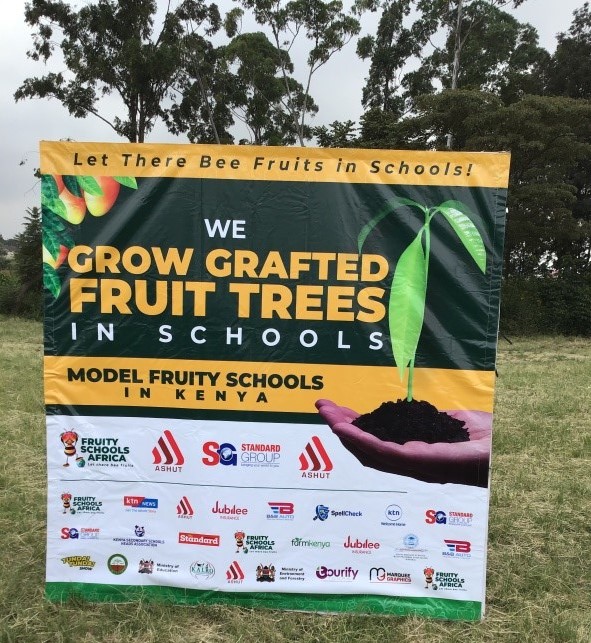
Model Fruity Schools Banner with Sponsors
Mr. Kennedy Odoyo, Team Leader Fruity Schools Africa, thanked all stakeholders for making the project a success. “This project seeks to achieve two things; first to contribute towards the Government’s objective of achieving 10% tree cover by 2022 and secondly educate children from an early age the importance of environmental conservation,” he said.
In a statement read on his behalf, Dr. Julius Jwan PS Ministry of Education, pledged the Ministries support towards the project. He stated that the launch was just the beginning and the project will soon spread throughout the country. 237 primary schools in Nairobi are targeted to receive 41 grafted seedlings each.
Dr. Jane Njuguna delivered CS Tobikos remarks stating that the Ministry of Environment is keen to see the inclusion of schools in achieving improved tree cover in the country. She pointed out that KEFRI is ready to provide whatever expertise necessary especially for species site matching and value addition in the form of jams and juices.
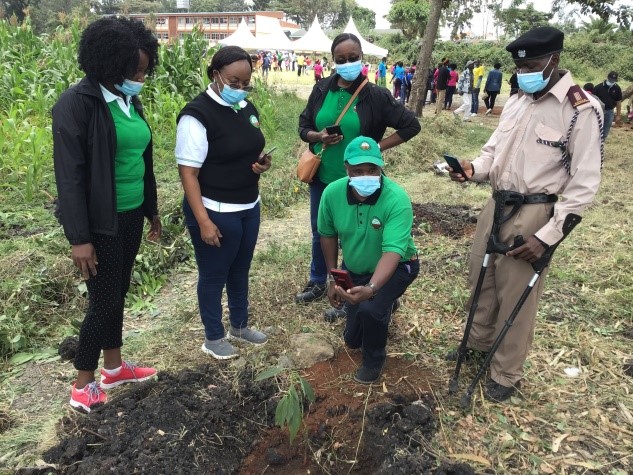
Dr Jane Njuguna and the KEFRI team demonstrating how to document tree planting using the KEFRIApp
The event provided an opportunity for the KEFRI team to demonstrate the use of the recently launched KEFRIApp in recording the number of trees planted. 200 grafted avocadoes and 100 strawberry guavas were planted during the launch.
Ecosystem Restoration with the slogan Reimagine-Recreate-Restore.
The Cabinet Secretary, Ministry of Environment and Forestry Keriako Tobiko led Kenyans in marking World Environment Day at Garissa University, Garissa County. The theme for this year’s celebrations was Ecosystem Restoration with the slogan Reimagine-Recreate-Restore.
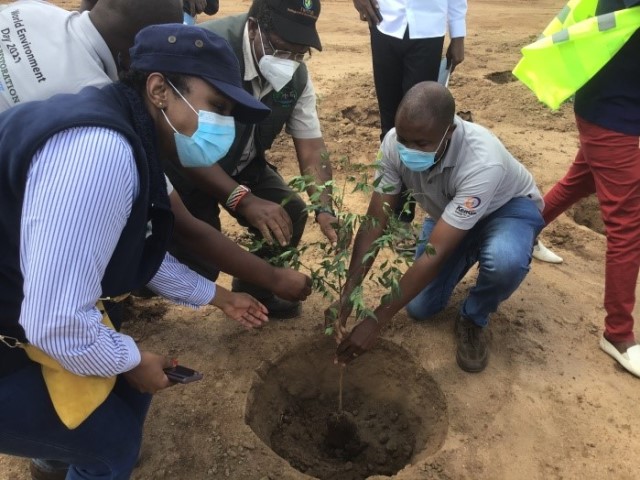
CS Keriako Tobiko with CAS Mercy Mwangangi during tree planting at Garissa University
The CS kicked off the celebrations by unveiling recycle bins that were donated to the University by Petco Ltd. The bins were donated in a bid to educate students on the importance of segregation and proper disposal of waste. Petco assured the CS that the company would undertake collection of the waste and ensure that recycling is done.
Hon. Mohamed Hire, MP for Lagdera in his remarks pointed out that Garissa County has immense environmental potential which has been ignored and underutilized. He pointed out that the residents needed to appreciate that there are other economic activities they can occupy themselves with apart from charcoal burning and animal grazing. He urged the constituents to embrace environmental conservation and preservation activities.
PS Chris Kiptoo stated that as much as the country has achieved 80% success on the ban on plastics, 20% is the responsibility of citizens who need to embrace and enforce the ban. “The government can make declarations and pass bills, but the onus is on each and every one of us to embrace and enforce these rules. The government cannot police everyone,” he said.
He further reported that a policy is in the pipeline which seeks to encourage a paradigm shift from a linear to circular model in order for the public to view waste as wealth. The PS also pointed out that KEFRI has been supported to increase seed centers from 6 to 18 around the country with a view of producing 200 metric tonnes of seeds per year. Garissa is earmarked to receive 42.5 metric tonnes.
Speaking during the celebrations, CS Keriako Tobiko announced that the celebrations also marked the launch of the UN Decade on Eco-System Restoration 2021-2030. The program is designed as a global movement that can end poverty, hunger, malnutrition, gender inequality and the degradation of ecosystems by harnessing the power of nature and local communities.
The CS explained that Garissa University was chosen as the venue for this year’s World Environment Day celebrations in order to show the world that Kenyans are resilient despite the attack that took place at the University in 2015 where 148 students lost their lives. 1000 trees were planted next to the hostel in which the attack occurred in commemoration of the departed souls.
Dr. Jane Njuguna, Senior Deputy Director Research and Development KEFRI and staff from KEFRI Kitui and Garissa centres joined the Ministry in marking the event which included cleanup activities and tree planting in primary and secondary schools.
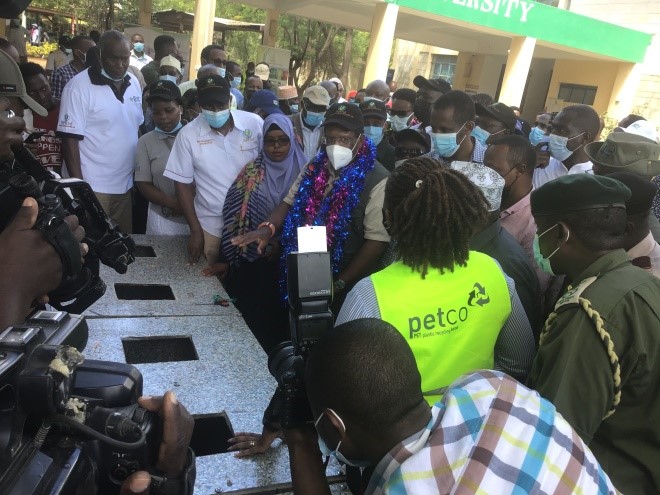
Recycling bins unveiled at Garissa University during World Environment Day celebrations